#nina attempts daily art
Explore tagged Tumblr posts
Text

its august 9th, which in japan is bug day, so heres a wriggle nightbug!
can you tell i put way more effort into this one than the normal sketches (i love wriggle and bugs)
20 notes
·
View notes
Text
Peter Anderson: Hi, my name is Peter Anderson. I'm from Peter Anderson Studio and we created the title sequence to Good Omens Season Two. So this scene is quite literally a continuation from Season One.
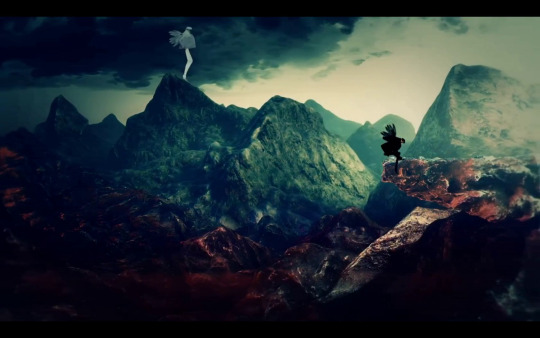
An interesting detail with this scene is the fly. The fly is significant because it stores Gabriel's memory.
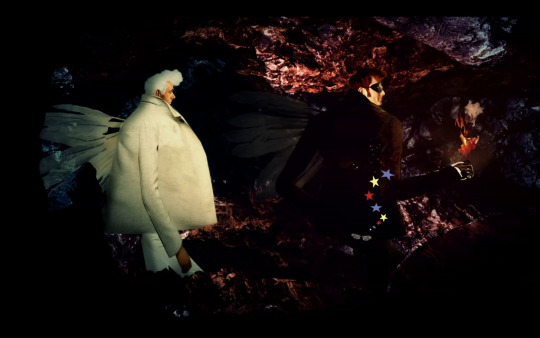
Gabriel is hidden in every scene. This is the first time we see it.
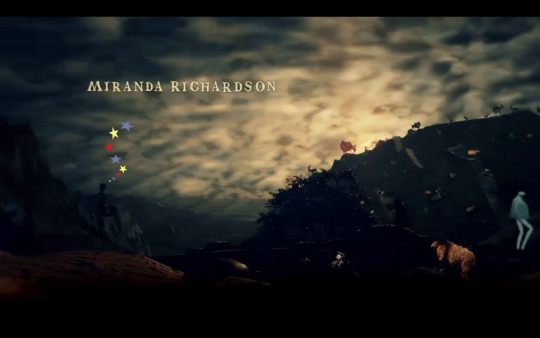
This goat is half bird, half goat, representing a mistake in a moment of transformation.
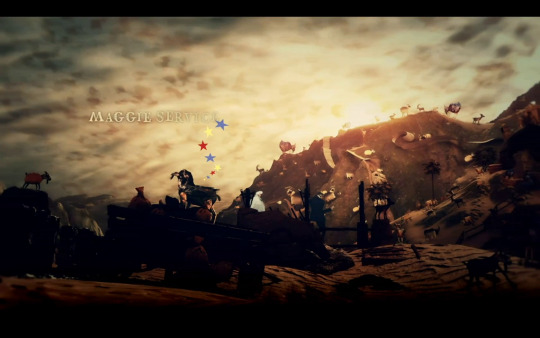
In the pickled herring barrel, we have literally red herrings sticking out.
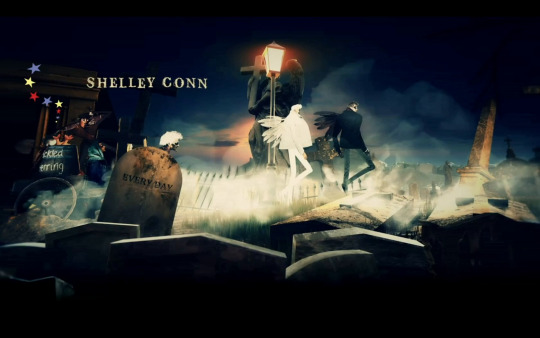
A lot of the gravestones have hidden engravings, easter eggs, all written by Neil.
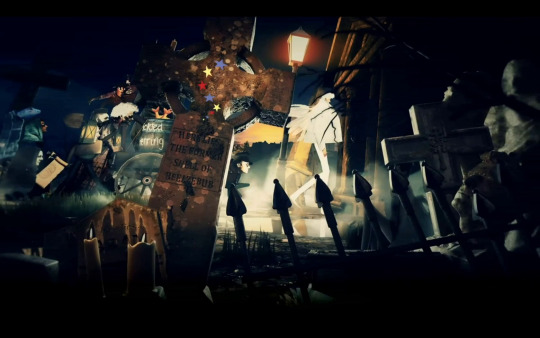
[This one says: HERE LIES THE FORMER SHELL OF BEELZEBUB referncing Beelzebub having a new face in S2 :), another ones are: EVERYDAY, JANE AUSTEN, Here lies ADAM (the Adam from Adam and Eve is meant)]
Another hidden Gabriel.
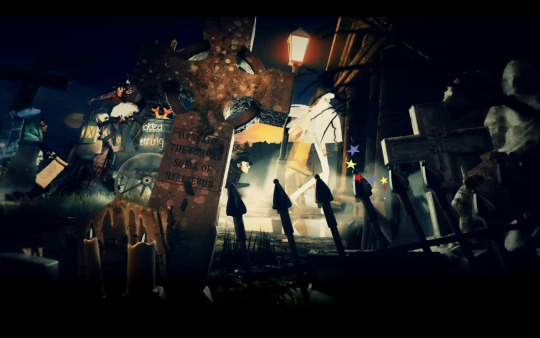
Our same character that was trying to escape Hell in Season One titles is also trying to escape here, moving in the opposite direction to the rest of the procession. Except this time he's apprehended and dragged back into the procession.
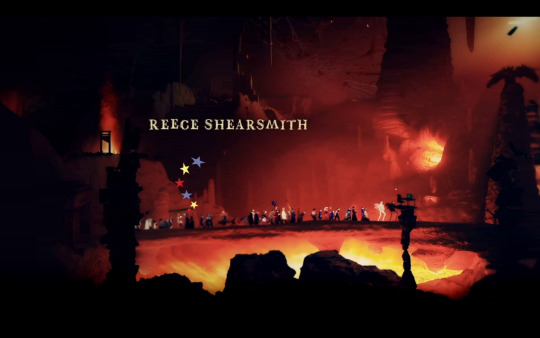
Our Hell spider from episode four makes a little appearance in the background here.
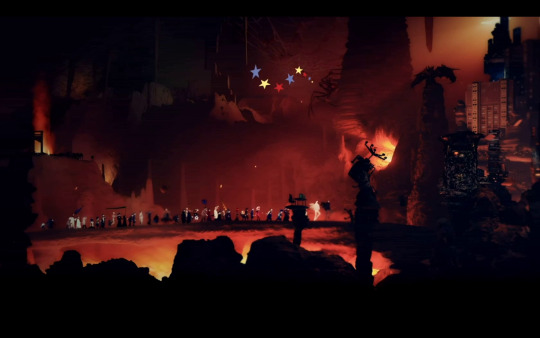
Can you tell where the bus is going? Director Douglas McKinnon selected Powell and Pressburger's Stairway to Heaven to put on the billboard.
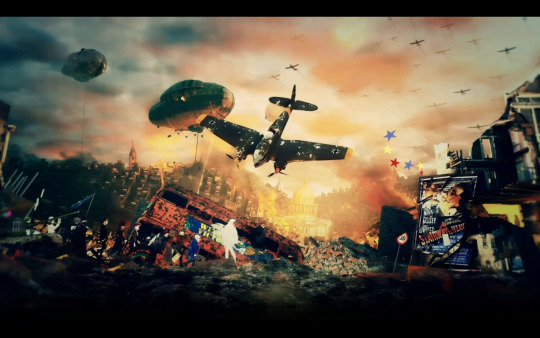
Another thing to note here is the type is all handmade specifically for Good Omens. The Alphabet only exists within the show.
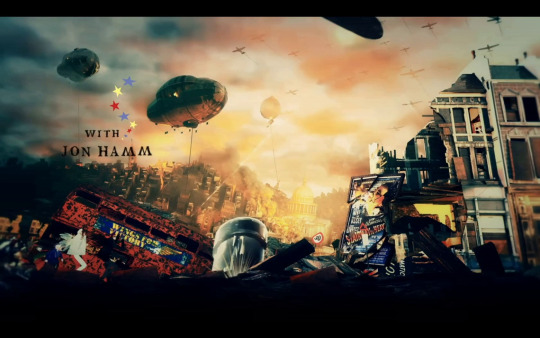
The big floating turnip is a nod to Azirafel's magic tricks.
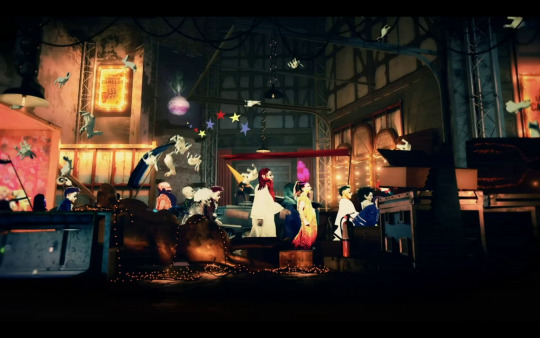
The Ladies of Camelot poster we pulled from the show.

We added plaques to the back of the chairs and Neil chose who to honour.
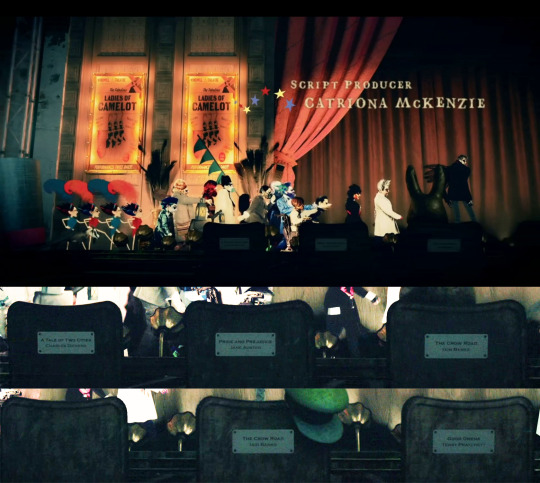
[There are: A TALE OF TWO CITIES by CHARLES DICKENS, PRIDE AND PREJUDICE by JANE AUSTEN, THE CROW ROAD by IAIN BANKS (twice!) and GOOD OMENS by TERRY PRATCHETT (Neil missing for some reason :) <3)]
Saraqael made an appearance from Heaven.
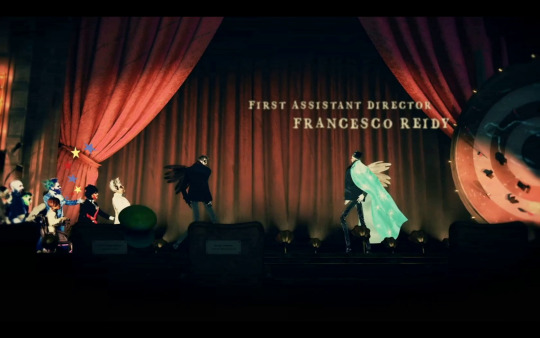
Our Space is back from Season One. Aziraphale and Crowley are having a little dance here. A moment of flirtation. There's a tiny planet in the middle that comes into existence at this moment.
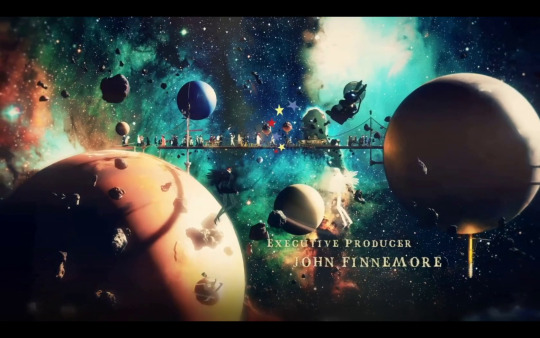
Our Scottish tartan hills make an appearance here.
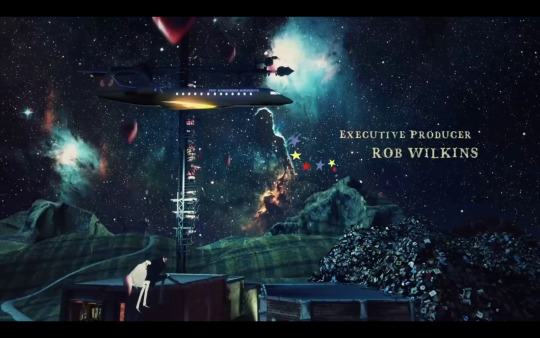
The aeroplane and the airline is a little bit of a clue here.

[THY KINGDOM AIRWAYS 👀]
It's raining love hearts in reference to Aziraphale's attempt at making Maggie and Nina fall in love.
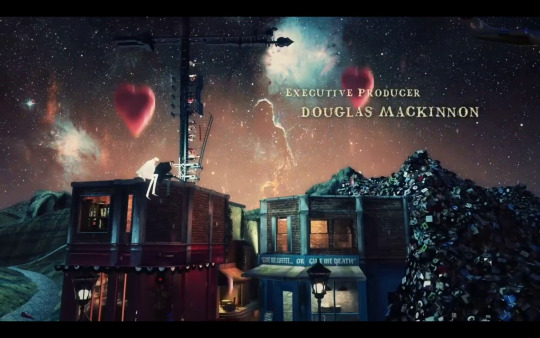
Here are elevators to Heaven and Hell. A wee thing to spot. Here is Gabriel in the lift arriving from Heaven.
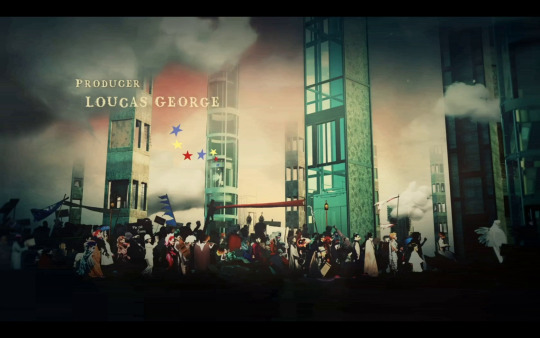
We've updated our flags to reference some of the plotlines in Season Two. For example, The Second Coming.

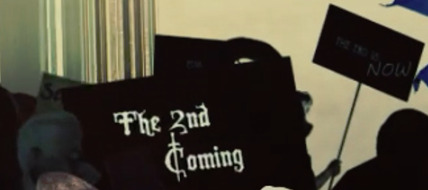
The movie poster artwork changes every week, representing the episode plotlines and the minisodes. We made the posters to look like the time period and in this case we've got a Good Omens version of Buddy Holly.
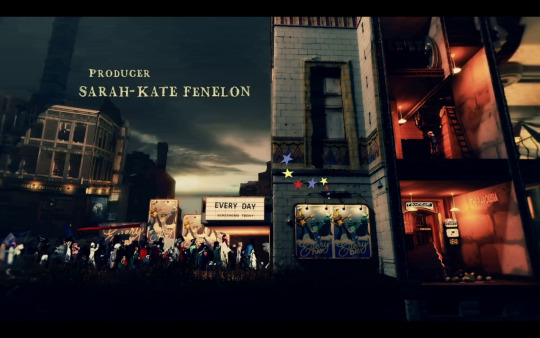
[The posters are:]
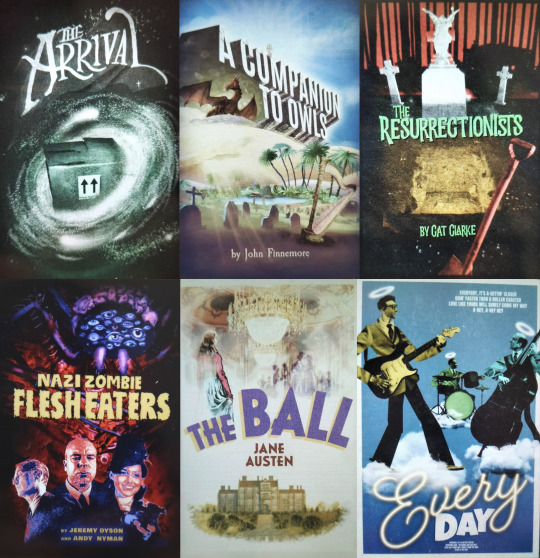
In the snack bar some of our popcorn is actually communion wafers.
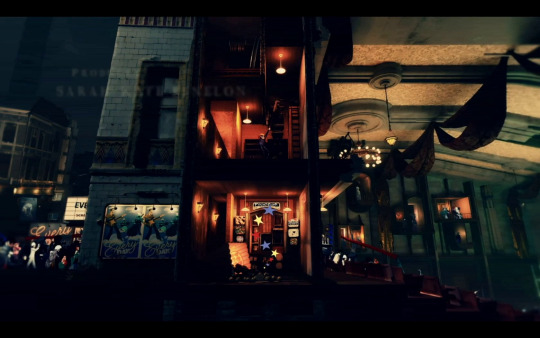
There are specific characters from Season One in the boxes watching the movie as the procession goes by. This includes some of our original concept art from Season One.
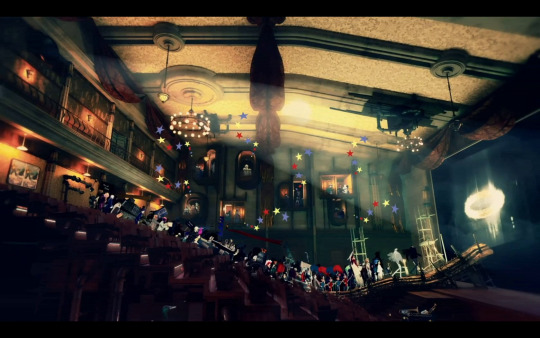
The duck playing the accordion is from a newspaper headline that someone is reading in The Dirty Donkey from one of the episodes.
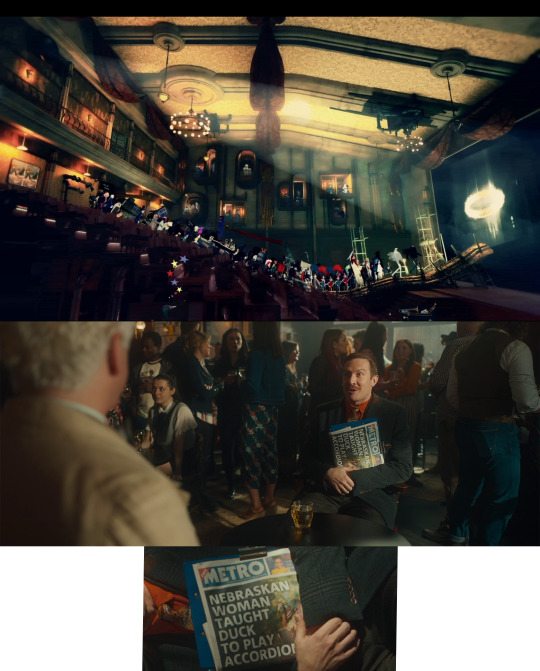
[this is also from the Good Omens book :): "Daily Mail. 'Letter From America.' Um, August the third," said Newt. "Just after the story about the woman in Worms, Nebraska, who taught her duck to play the accordion."]
Each episode is showing a new movie on the screen, each one selected by Douglas, and has clues about what's to come.
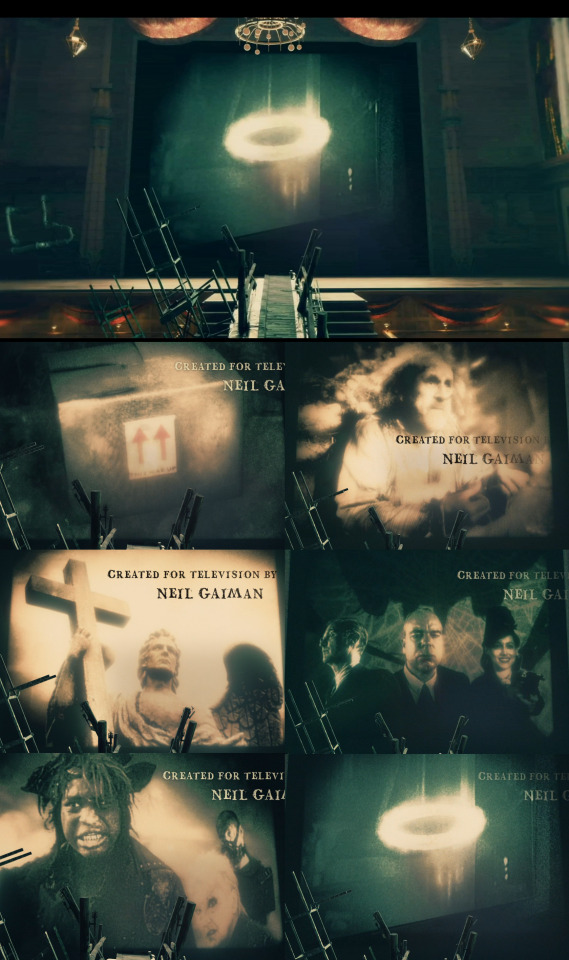
The season one phone box tumbles in the background.
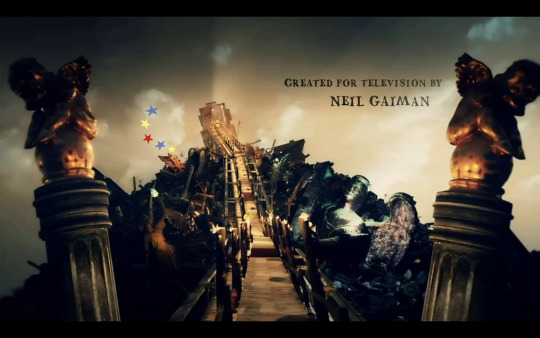
The big mountain is made of all the ingredients from Season Two and a couple of remnants from Season One. We are heading towards the biggest Easter Egg, which is the lift. We're heading towards the Second Coming..
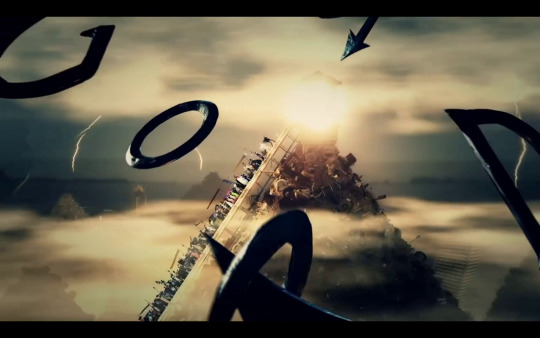
#good omens#perer anderson#peter anderson studio#bts#opening title#s2 opening title#fun fact#second coming#kingdom thy airways#duck playing accordion#videos#bts videos#easter eggs
3K notes
·
View notes
Text

The Critic ★★½
The Critic is a disappointing exploration of theater criticism set in 1934 London. The film introduces us to Jimmy Erskine (Ian McKellen), a self-proclaimed intellectual and theater critic for the Daily Chronicle, who prides himself on his high standards for the city’s theater scene. However, beneath this veneer of sophistication lies a smug, self-centered figure who takes pleasure in ruthlessly tearing down talented performers. His latest target is Nina Land (Gemma Arterton), Brooke’s favorite actress, whom he cruelly demeans in his reviews. His harsh assessments liken her to "livestock," showcasing not only his disdain but also his lack of empathy for the artists he critiques.
While McKellen delivers a commendable performance, the film suffers from a disjointed narrative that struggles to maintain momentum. The pacing feels uneven, with moments of intrigue overshadowed by lengthy stretches of dialogue that often come off as pretentious rather than insightful. The character development is superficial; Nina, despite being central to the story, lacks the depth necessary for viewers to truly empathize with her plight.
Furthermore, the film's attempts to critique the power dynamics within the arts feel heavy-handed and lack subtlety. Instead of offering a nuanced exploration of the critic's role, it often resorts to cliché tropes that fail to engage the audience meaningfully.
Overall, The Critic is an ambitious project that misses the mark, resulting in a lackluster viewing experience that leaves audiences more bewildered than enlightened.
0 notes
Text
THE FORTY-FIVE: ST. VINCENT

Sleazy, gritty, grimy – these are the words used to describe the latest iteration of St. Vincent, Annie Clark’s alter ego. As she teases the release of her upcoming new album, ‘Daddy’s Home’, Eve Barlow finds out who’s wearing the trousers now.
Photos: Zackery Michael
Yellow may be the colour of gold, the hue of a perfect blonde or the shade of the sun, but when it’s too garish, yellow denotes the stain of sickness and the luridness of sleaze. On ‘Pay Your Way In Pain’ – the first single from St. Vincent’s forthcoming sixth album ‘Daddy’s Home’ – Annie Clark basks in the palette of cheap 1970s yellows; a dirty, salacious yellow that even the most prudish of individuals find difficult to avert their gaze from. It’s a yellow that recalls the smell of cigarettes on fingers, the tape across tomorrow’s crime scene or the dull ache of bad penetration.
The video for the single, which dropped last Thursday, features Clark in a blonde wig and suit, channeling a John Cassavetes anti-heroine (think Gena Rowlands in Gloria) and ‘Fame’-era Bowie. She twists in front of too-bright disco lights. She roughs up her voice. She sings about the price we pay for searching for acceptance while being outcast from society. “So I went to the park just to watch the little children/ The mothers saw my heels and they said I wasn’t welcome,” she coos, and you immediately recognise the scene of a free woman threatening the post-nuclear families aspiring to innocence. Clark is here to pervert them.
She laughs. “That’s how I feel!” From her studio in Los Angeles, she begins quoting lyrics from Jimi Hendrix’s ‘Red House’. “It’s a blues song for 2021.” LA is a city Clark reluctantly only half calls home, and one that is opposed to her vastly preferred New York. “I don’t feel any romantic attachment to Los Angeles,” she says of the place she coined the song ‘Los Ageless’ about on 2017’s ‘Masseduction’ (“The Los Ageless hang out by the bar/ Burn the pages of unwritten memoirs”).“The best that could be said of LA is, ‘Yeah it’s nice.’ And it is! LA is easy and pleasant. But if you were a person the last thing you’d want someone to say about you is: ‘She’s nice!’”
On ‘Daddy’s Home’, Clark writes about a past derelict New York; a place Los Angeles would suffocate in. “The idea of New York, the art that came out of it, and my living there,” she says. “I’ve not given up my card. I don’t feel in any way ready to renounce my New York citizenship. I bought an apartment so I didn’t have to.” Her down-and-out New York is one a true masochist would love, and it’s sleazy in excess. Sleaze is usually the thing men flaunt at a woman’s expense. In 2021, the proverbial Daddy in the title is Clark. But there’s also a literal Daddy. He came home in the winter of 2019.

On the title track, Clark sings about “inmate 502”: her father. He was sentenced to 12 years in prison for his involvement in a $43m stock fraud scheme. He went away in May 2010. Clark reacted by writing her third breakthrough album ‘Strange Mercy’ in 2011; inspired not just by her father’s imprisonment but the effects it had on her life.“I mean it was rough stuff,” she says. “It was a fuck show. Absolutely terrible. Gut-wrenching. Like so many times in life, music saved me from all kinds of personal peril. I was angry. I was devastated. There’s a sort of dullness to incarceration where you don’t have any control. It’s like a thud at the basement of your being. So I wrote all about it,” she says.
Back then, she was aloof about meaning. In an interview we did that year, she called from a hotel rooftop in Phoenix and was fried from analytical questions. She excused her lack of desire to talk about ‘Strange Mercy’ as a means of protecting fans who could interpret it at will. Really she was protecting an audience closer to home. It’s clear now that the title track is about her father’s imprisonment (“Our father in exile/ For God only knows how many years”). Clark’s parents divorced when she was a child, and they have eight children in their mixed family, some of whom were very young when ‘Strange Mercy’ came out. She explains this discretion now as her method of sheltering them.
“I am protective of my family,” she says. “It didn’t feel safe to me. I disliked the fact that it was taken as malicious obfuscations. No.” Clark wanted to deal with the family drama in art but not in press. She managed to remain tight-lipped until she became the subject of a different intrusion. As St. Vincent’s star continued to rocket, Clark found herself in a relationship with British model Cara Delevingne from 2014 to 2016, and attracted celebrity tabloid attention. Details of her family’s past were exposed. The Daily Mail came knocking on her sister’s door in Texas, where Clark is from.
“Luckily I’m super tight with my family and the Daily Mail didn’t find anybody who was gonna sell me out,” she says. “They were looking for it. Clark girls are a fucking impenetrable force. We will cut a bitch.”
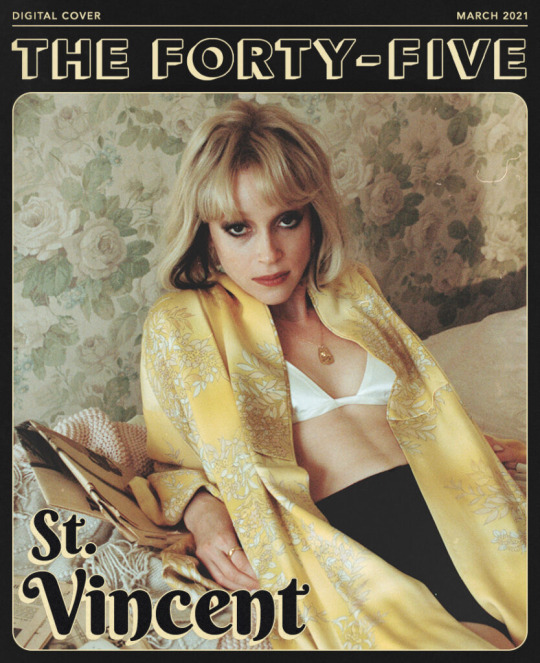
Four years later, Clark gets to own the narrative herself in the medium that’s most apt: music. “The story has evolved. I’ve evolved. People have grown up. I would rather be the one to tell my story,” she says, ruminating on the misfortune that this was robbed from her: a story that writes itself. “My father’s release from prison is a great starting point, right?” Between tours and whenever she could manage, Clark would go and visit him in prison and would be signing autographs in the visitation room for the inmates, who all followed her success with every album release, press clipping and late night TV spot. She joked to her sisters that she’d become the belle of the ball there. “I don’t have to make that up,” she says.
There’s an ease to Clark’s interview manner that hasn’t existed before. She seems ready not just to discuss her father’s story, but to own certain elements of herself. “Hell where can you run when the outlaw’s inside you,” she sings on the title track, alluding to her common traits with her father. “I’ve always had a relationship with my dad and a good one. We’re very similar,” she says. “The movies we like, the books, he liked fashion. He’s really funny, he’s a good time.” Her father’s release gave Clark and her brothers and sisters permission to joke. “The title, ‘Daddy’s Home’ makes me laugh. It sounds fucking pervy as hell. But it’s about a real father ten years later. I’m Daddy now!”

The question of who’s fathering who is a serious one, but it’s also not serious. Clark wears the idea of Daddy as a costume. She likes to play. She joins today’s Zoom in a pair of sunglasses wider than her face and a silk scarf framing her head. The sunglasses come off, and the scarf is a tool for distraction. She ties it above her forehead, attempts a neckerchief, eventually tosses it aside. Clark can only be earnest for so long before she seeks some mischief. She doesn’t like to stay in reality for extensive periods. “I like to create a world and then I get to live in it and be somebody new every two or three years,” she says. “Who wants to be themselves all the time?”
‘Daddy’s Home‘ began in New York at Electric Lady studios before COVID hit and was finished in her studio in LA. She worked on it with “my friend Jack” [Jack Antonoff, producer for Lana Del Rey, Lorde, Taylor Swift]. Antonoff and Clark worked on ‘Masseduction’ and found a winning formula, pushing Clark’s guitar-orientated electronic universe to its poppiest maximum, without compromising her idiosyncrasies. “We’re simpatico. He’s a dream,” she says. “He played the hell outta instruments on this record. He’s crushing it on drums, crushing it on Wurlitzer.” The pair let loose. They began with ‘The Holiday Party’, one of the warmest tracks Clark’s ever written. It’s as inviting as a winter fireplace, stoked by soulful horns, acoustic guitar and backing singers. “Every time they sang something I’d say, ‘Yeah but can you do it sleazier? Make your voice sound like you’ve been up for three days.” Clark speaks of an unspoken understanding with Antonoff as regards the vibe: “Familiar sounds. The opposite of my hands coming out of the speaker to choke you till you like it. This is not submission. Just inviting. I can tell a story in a different way.”
The entire record is familiar, giving the listener the satisfaction that they’ve heard the songs before but can’t quite place them. It’s a satisfying accompaniment to a pandemic that encouraged nostalgic listening. Clark was nostalgic too. She reverted to records she enjoyed with her father: Stevie Wonder’s catalogue from the 1970s (‘Songs In The Key Of Life’, ‘Innervisions’, ‘Talking Book’) and Steely Dan. “Not to be the dude at the record store but it’s specifically post-flower child idealism of the ’60s,” she explains. “It’s when it flipped into nihilism, which I much prefer. Pre disco, pre punk. That music is in me in a deep way. It’s in my ears.”
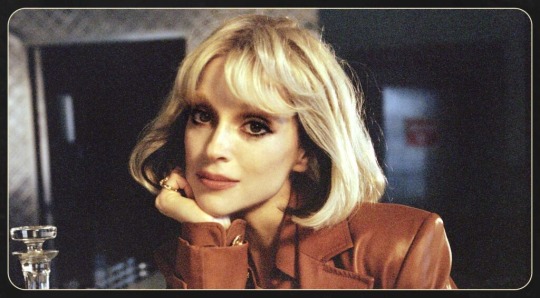
On ‘The Melting Of The Sun’ she has a delicious time creating a psychedelic Pink Floyd odyssey while exploring the path tread by her heroes Marilyn Monroe, Joni Mitchell, Joan Didion and Nina Simone. It’s a series of beautiful vignettes of brilliant women who were met with a hostile environment. Clark considers what they did to overcome that. “I’m thanking all these women for making it easier for me to do it. I hope I didn’t totally let them down.” Clark is often the only woman sharing a stage with rock luminaries such as Dave Grohl, Damon Albarn and David Byrne, and has appeared to have shattered a male-centric glass ceiling. She’s unsure she’s doing enough to redress the imbalance. “There are little things I can do and control,” she says of hiring women on her team. “God! Now I feel like I should do more. What should I do? It’s a big question. You know what I have seen a lot more from when I started to now? Girls playing guitar.”
If one woman reinvented the guitar in the past decade, it’s Clark. Behind her is a rack of them. The pandemic has taken her out of the wild in which she’s accustomed to tantalising audiences at night with her displays of riffing and heel-balancing. Instead, she’s chained to her desk. Her obsession with heels in the lyrics of ‘Daddy’s Home’ she reckons may be a reflection of her nights performing ‘Masseduction’ in thigh highs. “I made sure that nothing I wore was comfortable,” she recalls. “Everything was about stricture and structure and latex. I had to train all the time to make sure I could handle it.” Is she taking the heels off when live shows return? “Absofuckinglutely not.”

Clark is interested in the new generation. She’s recently tweeted about Arlo Parks and has become a big fan of Russian singer-songwriter Kate NV. “I’m obsessed with Russia,” she says. In a recent LA Times profile, she professed to a pandemic intellectual fixation on Stalin. “Yeah! I mean right now my computer is propped up on stuff. You are sitting on The Gulag Archipelago, The Best Short Stories Of Dostoyevsky andThe Plays Of Chekhov. I’m kinda in it.” The pop world interests Clark, too. She was credited with a co-write on Swift’s 2019 album ‘Lover’. At last year’s Grammys she performed a duet with Dua Lipa. It was one of the queerest performances the Grammys has ever aired. Clark interrupts.
“What about it seemed queer?!”
You know… The lip bite, for one!
“Wait. Did she bite her lip?”
No, you bit your lip.
“I did?!”
Everyone was talking about it. Come on, Annie.
“Serious? I…”
You both waltzed around each other with matching hairdos, making eyes…
“I have no memory of it.”
Frustrating as it may be in a world of too much information, Clark’s lack of willingness to overanalyse every creative decision she makes or participates in is something to treasure. “I want to be a writer who can write great songs,” she says. “I’m so glad I can play guitar and fuck around in the studio to my heart’s desire but it’s about what you can say. What’s a great song? What lyric is gonna rip your guts open. Just make great shit! That’s where I was with this record. That’s all I wanna do with my life.”
More than a decade into St. Vincent, Clark doesn’t reflect. She looks strictly forward. “I’m like a horse with blinders,” she says. She did make an exception to take stock lately when the phone rang. “I saw a +44 and that gets me excited,” she says. “Who could this be?” Well, who was it? “Paul McCartney,” she says, in disbelief. “Anything I’ve done, any mistake I’ve made, somehow it’s forgiven, assuaged. I did something right in my life if a fucking Beatle called me.”
Now there’s a get out of jail free card if ever she needed one.
Daddy’s Home by St. Vincent is out May 14, 2021.
#‘I HAVE NO MEMORY OF IT’#LOOOOOL#WHY ARE U LIKE THIS#st vincent#full of shit#annie clark#Annie Clark on beds#yellow is the color for dull ache of bad penetration?
68 notes
·
View notes
Text
The Princess and the Barbarian

A Helnik tale, rated T. As Matthias recovers from a gunshot wound, Nina tells him the story of the Princess and the Barbarian. He interrupts a lot as his Fjerdan sensibilities are bothered and the Ravkan propaganda gets to be unbearable. Thank you @theburnbarreljester for beta-ing and for reminding me that we’re all here for the biting and trembling of lips.
Previous Chapters
Chapter 6
Inessa studied the landscape from the edge of the cave. She could see endless green sloping hills, the curved slice of a river, and the rocky path that led to her place of captivity. Her bound wrists were staked to the rocky ground of the cave and she could loosen the metal and slide out of the chains. She usually did for the first hour the barbarian was gone each day. But as the sun moved to the center of the sky, she knew it best to chain herself again and stay inside the wide, hard-packed confines of the cave to keep her ability to escape a secret. He seemed to think her powers were limited to fabrics and she didn’t want to alert him on what exactly she could do. She’d leave as soon as she knew where she was and had something better on her feet than her ruined dancing shoes.
Her best guess was that the barbarian had her in the woods near Halmhend, well into Fjerdan territory. She’d have to cross either the Permafrost to get to Chernast or go south through the forest to Ulensk to make it back to Ravka. If she escaped through the ice, she was likely to lose fingers or worse on the journey. And the nightly shrieks and howls from the wolves coming from deep within the woods were enough to make her long for even the barbarian’s comfort.
He rarely gave it.
On the first night he’d told her to stop her weeping for the dead with a harsh “The dead can’t hear you mourn but the living can. I might not be able to save you from the wolves or my countrymen if they come in force.” Then he’d made her burn her only remaining item of clothing and as the chemise went up in flames he’d given her his roughspun shirt. It still bore his scent even weeks later though she probably could have fabrikated that away if she wished. It felt like armor, being surrounded by the smell of the tundra and the smoke of campfires, even the trace of his sweaty musk. Like the volcra or the howling wolves or enemies she might find in this land would pass over her if she was disguised in his shirt and scent. It was a small comfort, but she clung to it. When he was off hunting or asleep she liked to run the fabric between her fingers, to run her hands underneath where the coarse material hit her thighs, not quite mourning that she’d never had a wedding night, but curious about what it would feel like for this barbarian to make her fully his.
He stayed bare chested in the cave and Inessa studied him like works of art she’d seen at the Grand Palace. He had cords of muscle along his arms and across his chest and his back was made up of hard planes that she surprised herself by wanting to run her hands across, to feel if Ravkan and Fjerdan bodies were made the same.
Once he’d thrown an elk carcass at her feet and demanded she cook and clean it, but she’d retched instead. Disgusted, he prepared the meat himself and then ate with an intensity and such a lack of decorum that Inessa stared, horrified and transfixed. He fed her too, bringing a jeweled goblet of mead to her lips and calling her “princess” in a way that was very different from the servants at Os Alta, like he was mocking her for being so useless.
He’d spent the next few days rendering the fat and making soap, stripping and treating the hide, drying the remaining meat in long strips. She’d watched it all without offering to help, but unable to look away from the way his arms looked while ripping bone from sinew, how the steam off of the cook fire made his long hair curl at his temple.
The cave was primitive but did have some comforts. She slept on what she assumed must have been his bed - a pile of furs and a hay pallet - while he slept by the entrance of the cave with his back to her. There were goblets like the one he offered her at meal times and stacks of animal pelts and barrels of mead and kvas arranged neatly against the side of the mountain.
Every night before he moved her chains to the bed and tied her there instead of the middle of the cave he asked about the Shadow Fold. He called her witch, he called her an abomination, he called her a privileged princess who didn’t know the havoc that such evil invited into the midst of the living. And each night she told him she had no idea how it was formed, who formed it, or how to extinguish it. She wanted to yell “It made me a widow and an orphan! Don’t you think I know the cost?” but cried silently instead, fabrikating the furs into the same soft heaviness as her quilts in the Grand Palace. Each morning she turned it back to fur, knowing he’d make her burn what he found changed.
She walked back into the cave and recited her daily prayers to the saints, beseeching them to safekeep her brother The Emperor and his wife and children. To keep the volcra confined to the Shadow Fold and to banish it forever. To see her in her suffering and give her a way to return home.
She heard the barbarian’s heavy footsteps behind her and then his voice, angry and rough. “What spells are you muttering, witch?”
“I’m saying prayers for my family. I can pray for you too if you’d like.” She turned to look at him and he scowled.
“I’ll take none of your prayers. Only Djel is the true maker and god.”
“You were gone longer today. Where did you go?” she asked, hoping he might mention the name of a town or a river that would help her figure out where they were, how she could leave.
“I was buying you this,” he said, throwing a bundle at her. “You can only have it if you promise not to alter it. No magic that would attract the volcra or widen the Shadow Fold.”
She began to unwrap the fabric strips and shook out the material inside. “It doesn’t work like that, fabrikating doesn’t - but then she stopped, struck by the absurdity of what he had given her. “This is a Fjerdan dress.”
“Yes. It is. Because you are in Fjerda. And because it is not proper for you to be wearing only my shirt as the days begin to turn colder.”
Inessa let one hysterical giggle leave her throat. That was what he found improper? Her wearing his shirt? He’d kidnapped her from her family and had her chained in a cave. And now he wanted her to wear the dress of a Fjerdan woman. She wished she’d studied their customs more closely, she might have been able to guess which town this was from based on the embroidered hem or the silver buttons on the sleeves. But then, another idea took form.
“If you want me in a new dress, please, let me bathe first. It’s been weeks.” Perhaps she could glimpse more of the terrain, gain a better understanding of where she was and how she could leave.
He looked at her for a long moment, a flicker of something in his eyes that she hadn’t seen before. “Alright. I’ll take you to where the beavers have made a dam.”
He unchained her from the ground but kept her hands bound, which meant she stumbled as she picked her way across the rocky path. He walked behind her, catching her under the elbow when she lost her footing and once grabbing her waist when she pitched towards the edge of the cliff. New clothes would help her in an escape attempt, but unless she had better shoes she wouldn’t get far.
The small pond created by the dam was clear and cold and Inessa gasped as she put her foot in. “Will you unchain me? So I can bathe?”
“No.” He thrust a chunk of the elk fat soap into her hands, a hard glint in his eye. “I will bathe you.”
She looked at him just as fiercely and then pulled his shirt over her head, shimmying awkwardly around the chains, so that she was standing bare before him with the shirt bunched up over the restraints and the tightly clutched soap. He pulled a knife out of its sheath by his waist and cut the shirt away from her.
“I’ll burn this tonight. Get rid of the witchy stench.”
Inessa was horrified to feel the prick of hot tears in her eyes as she stood naked in front of him, listening to the same insults he’d thrown at her daily. She turned and walked into the water, biting her lip against the cold and then submerging herself fully, trembling as soon as she surfaced for air with her eyes closed. She wiped at her eyes with her bound hands and then the barbarian was there, holding her head in his hands and using his thumbs to wipe the water from her eyes.
The water and his words were cold, but everywhere his hands touched her felt hot. He was still warm from their walk to the dam and she could feel it radiating off of his bare chest as he ran his hands along her forearms and then her upper arms and shoulders.
“I should not have brought you here to defile these waters. All waters feed Djel and are fed by him. We drown witches in these waters for his glory.” He rubbed his fingers in between hers and then scrubbed at her fingernails with his and she was acutely aware that he’d shucked his pants and boots and was as bare as she was. “But we have a saying, the water hears and understands. The ice does not forgive. Djel will forgive me for this transgression; it is in the service of keeping his people safe from your magic.”
“I don’t need you forgiveness, or that of the ice, either,” she snapped, shivering. The water was icy cold and with his words came the sensation that she was being drowned in them.
He took the soap from her and rubbed it over his hands until he formed a lather and then carefully slid his fingers under the chains around her wrists. He scrubbed her gently and silently and she tried to control her gasping breaths by calling to mind memories of home.
“My mother’s soaps smelled of lavender,” she said and he grunted in response. “For her evening baths. Jasmine if it was in the morning.” She closed her eyes again, trying to remember the scent of it, the way it felt comforting and certain. The way it meant her mother was near and she was loved.
“Are Ravkans so dirty that they must bathe twice a day?” Her eyes flew open and she scowled.
“You're the barbarian! You haven’t bathed since well before you stole into Ravka, I’d wager.” She shivered and he dropped her hand.
“I’m bathing now aren’t I?” He handed her the soap and then went under the water. He emerged with his back to her and she watched as droplets of water ran down his back. His long hair was dripping and darker now that it was wet and he soon had it in a lather. He went under again then rose towards her, reaching for her chained hands and pulling her to himself. He took the soap from her, worked to make suds, and then buried his fingers into her wet hair.
It felt exquisite.
He scratched at her scalp and then down to the base of her neck and onto her shoulder blades, rubbing more soap along her back and down towards the curve of her bottom. She closed her eyes again and gave herself over the sensation of being made clean as his hands explored new places: her thighs, her ankles, a palm across her breasts that made her gasp and bite her lip again. He held her elbow as he dipped her under the water and when she emerged free of the filth and blood that had clung to her for weeks, she felt new.
He gave her a blanket to wrap herself in and they sat on the rocks at the edge of the dam watching the dying light of the sun as it edged closer to the horizon across the vast Permafrost to the west. They were farther east then she’d realized. Perhaps close to Chernast.
His hair was drying quickly and he ran his hands through it, tugging at knots in the golden strands. He looked young like this, perhaps even as young as she was. She might have offered to braid his hair, but her hands were shaking from the cold annd her own wet hair and she wasn’t sure what she’d do if her hands were in his hair. Strangle him? Rub it between her fingers and press her face against it? Both seemed like a good idea.
“We leave now. Before it gets dark.” He pulled his clothes on but she made no movement to put on the dress he’d given her. She definitely couldn’t manage it with the chains and even if she wasn’t chained, she’d only ever been dressed by lady’s maids.
He turned as he finished pulling up his pants and used his chin to point to the dress. “Put it on.”
“I can’t do it like this,” she said, raising her arms and showing him the chains.
He was silent as he walked to her and picked up the dress, separating it into three pieces and a pair of pantalettes that fell to the ground. He knelt down and held the layered skirts open and she stepped into them, stumbling into his chest as she lifted her leg. Her loose, wet hair encircled his head and he drew back as if stung. He rose and then turned her so her back was to him and cinched the ties at her waist, looping them roughly into knots. Then he spun her and undid the chains around her wrists with a key from his pocket.
“Steady now. Put your arms through.” He helped her into the bodice and then the woolen vest that covered it, his fingertips skimming the exposed skin at her waist before he drew the laces closed and tied them as well, his head bent over his work and inches from her chest.
“What’s your name?” she asked, like he was a new lady’s maid and she’d have to remember his name for when they repeated this routine in the morning before a gilded mirror and a porcelain washbasin.
“Iver.” He picked up the pantalettes and bent down to one knee as he held them for her to step into. She placed her hands on his shoulder.
“Thank you for the dress, Iver. And for the bath. My name is Inessa.”
“I know,” he said and then chained her hands once more before he stepped away from her, walking towards the path that had led them here. “It will be dark soon. Best leave now.”
She followed him back to the cave in silence. He built a fire and cooked a rabbit and he asked the same question he asked every night. And even though her answer was the same, everything changed.
“Inessa, do you know anything about the darkness that made the fold? About the fold itself?”
“No, Iver. I don't.”
He looked at her across the flickering light cast by the fire and she thought of how much the shadows it cast looked like the volcra. How the red flames looked like the bright bursts of blood she’d seen the day of the volcra attack. He moved to her slowly and then reached for the chains at her wrists, undoing the lock and then rubbing her wrists as the heavy links fell away. Inessa looked at his hands on hers, so large and now so gentle, and when he pulled away and stood, she wanted to reach out and draw him back down. She wanted to touch every inch of his skin, to know the way each cell melded together, to feel him as he joined with her, to understand the making of him.
“There. You sleep like that now,” he said, and then stalked off from the cave and into the night.
#helnik#helnik fan fic#matthias helvar#nina zenik#post crooked kingdom but Matthias lives#the princess and the barbarian
12 notes
·
View notes
Text
Alyse Reads The Goldfinch, Part 2
What follows is my best attempt at liveblogging. I had the books as an audiobook in hopes that I could keep it from taking even more of my life from me. This was perhaps a mistake. I think I broke Siri trying to make notes. The notes that are rambly are the ones I dictated.
I entirely blame @rollono for my suffering. But I am also aware that it seems to give her joy.
Every time I reference Tara, I am talking about @wellntruly who’s own live blog of the book was the only roadmap I had to follow in this waterlogged wasteland of a novel.
Part 1
I thought Tara was making up the Camel-hair coat bit but APPARENTLY NOT.
Architecture has that much to do with the city and or northern Europe, really? I mean, “whitewash” doesn't everybody do that?
Nina ( @proud-librarian ) is going to have a lot to say about their descriptions of the Netherlands and Amsterdam in this book. like oh my God!
Theo Deckard doesn't understand how thermostats work.
This isn't satire? I don't understand we're like three minutes in and it has to be satire. right. right?
Who the hell says my mother and I didn't like my father much? like what.... what is this? what am I reading? what is happening? what.... I don't understand.... okay maybe fine whatever
This feels like it should be... I don't know.... satire is the word I'm looking for again. I don't want to just repeat what Tara, said but Jesus. the start of the story is he is rich enough to have a Doorman but not rich enough to afford the fancy private school, and him and his friends break into vacation homes in the Hamptons. what is this? what is this? I just... just.... just write a Jane Austen or Lord Byron novel if that's what you want to do just do that. do that.
My audiobook app just turned itself off in the middle of a passage because it decided I didn't need to listen to Theo talk about whatever he was talking about.
Curse you, Donna Tartt, for also being in the "all things coconut smell like suntan lotion" club. I did not want to have this in common with you.
I am laughing so hard it turns silent into my steering wheel because the audiobook reader makes Tom Cable sound like a surfer dude from the 70s, and I. cannot. handle. that.
"I like to think of myself as a perceptive person" is basically the way that I know that Theo has about Harry Potter level skills of observation when it comes to the people around him.
Y'all this book would be so much better if Theo actually thought like a 13-year-old that he is supposed to be in the intro part. That would just be peak comedy, which is really what I'm looking for.
Audrey Decker and the Laura Moon from American gods are now the two people that I have ever known to call men "puppy" which I still find alarming, in both cases. Surprisingly they also both die, so I guess more things they have in common.
The longer this book goes on the more clear it is that I am not bougie enough for its contents. ( timestamp 30 minutes)

(GIF BY @rollono BY MY REQUEST FOR EVERY TIME THIS BOOK MAKES ME FEEL POOR)
I just can't suspend my disbelief enough to think that a 13-year-old would know this much about their parent's job and be able to ask questions. I'm trying to think of what my dad was doing when I was 13, and I mean I know where he worked, and I know who his boss was, but if you tried to ask me daily issues or me giving advice... oh my gosh. I just can't. nobody talks like this.
I’m making a face akin to Kermit the frog.
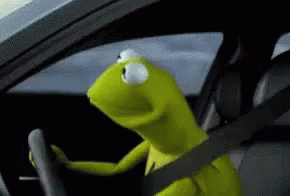
I threw up in my mouth a little at the description of Pippa walking past in the museum.
Did we just describe a 12-year-old girl's arms as marble? is that what just happened? did I just have to listen to that?
Theo has given me a lot of like “Golden State killer” vibes right now with his desire to poke around through all these people's homes and stuff. like this is clearly the Visalia ransacker's motivation in the 70s. I know too much about true crime, that's what's happening right now.
The true-crime serial killer alarms keep going off in my brain.
I know Tara already mentioned how ridiculous the Murphys bed story is but it really is incredibly ridiculous and breaks the tension of the entire scene that is occurring at the time (laughed uncontrollably to the point that Siri typed nonsense)
I get it, Donna, you know things. You do not have list every fire truck to prove it.
Let's take a child to a dinner at 3 am. Really Donna?
Why does Donna insist on giving me the text of signs around whats going on? Why did I just listen to the smoothie specials while an emotional scene is occurring?
Donna, did you just call Mrs. Barough a weasel? [afronted gasp]

OI! (me shouting when Donna says that Andy was weird for being lactose intolerant.)
Pukes in my mouth a little at the term 'high verbal'. I get it, Donna, you think you are smarter than all of us stop being a dick.
Donna Tartt would make it to r/iamverysmart in like a minute if she understood how the internet worked.
WHO TAUGHT HER ABOUT FMA?
Okay, so either Donna Tartt knows someone who lost a parent and basing this off them or like went through it herself because I am white-knuckling through the grief bits trying not to have my own trauma response to the situation. Or she wrote Theo with like the exact grief I had. Her incessant need to list things in a room is the only thing between me and a spiral of remembering my dad's death.
ANDY IS A RAY OF LIGHT AND DOES NOT DESERVE TO BE IN THIS FAMILY OR IN THIS BOOK!
Five whole hours before the first sight of Hobie. Like Jesus.
I miss Terry Pratchett.
Hobie thank you for making this book interesting again.
Hobie is now my main squeeze and I won't hear a word against him.
POE DIDN'T INVENT SCIENCE FICTION FUCKING MARY SHELLY DID. DONNA WHAT THE FUCK.
The Hobie part of the story just makes me more sure that a version of the movie should have been without the Baroughers (sp?) and only included Hobie and Pippa.
Any is a murderino. I love this baby boy.
Aw, I love Hobie so so much.
Donna if you call Andy annoying one more time you are gonna catch my hands. (She just referred to his voice as annoying twice in a conversation and I swear to god I will rip this character out of her snobbish clutches she doesn't deserve him.)
Theo on this we agree, I too enjoy Hobie.
Hobie is the only person who belongs in this novel and he's a god damn delight.
SEVEN HOURS AND THE PAINTING HAS COME UP AGAIN FOR THE FIRST TIME IN LITERAL HOURS.
Theo straight up using Spanish to fuck over his father is just *chef's kiss.
I can see how much contempt Donna has for Xandra is longer and deeper than this book will ever be.
I am going to suplex Larry Decker I swear to god. (i have a very particular trigger to spouses bad-mouthing the dead one due to personal experience.)
Necco wafers are no one's favorite candy Donna. You can't just say shit like that and expect anyone to believe you.
I have just realized that Donna Tartt has never been to a public library. How do I know? Witchcraft books are never on the shelves. Ask any librarian. They are stolen pretty much the moment we buy them.
I am standing dead in the tea aisle at the store because Theo just thought it would be “gay” to tell the doormen he has known almost his whole life he is gonna miss them. (hours later I realize this is her backtracking in edits going "shit shit shit I have to add the repression in somewhere for those dumb readers that don't understand art" and I hate it more.)
Mrs. B is ready to physically fight Larry and I would pay real money to see it.
WHY DOES DONNA KNOW ABOUT DRAGON BALL Z?!? Step away from the things I love Donna I don't trust you near my media. (Also why she does reference it she clearly has NO concept of what DBZ hair would even look like to expect me to believe any child could achieve it.)
oh my god, Boris. I'm so happy to see you.
I am happy to report the audiobook narrator does not do an Australian accent for Boris. Thank the lord.
I knew I was going to love Boris but like a few minutes in I adore him.
It's interesting to me that Theo and Boris seem to have received similar amounts of attention/affection from non-parent adults, but while Theo finds it uncomfortable Boris soaks it in.
The Australian part of Boris's accent seems impossible.
*sobbing audibly into my keyboard* Popchyck
Boris you sweet like socialist.
Comrade Boris we need you in this election.
I'm sad he (Boris) doesn't get to go to college and like piss off every yuppie and hippie, and just make Philosophy 100 and Government 250 absolute hell for everyone.
Drunk Boris at Thanksgiving is a gift.
Me listening to this book before Boris: half paying attention, fucking around on my computer, doing chores. Me after Boris shows up: staring at the middle distance determined to listen to every fucking word because this prison sentence of a novel is finally interesting.
James: you said the author is a snob and you aren't enjoying the main character. Me: yeah James: then stop reading it. Me: No, then Donna and her Anna Wintour knock off hair cut will win. James, frowning and backing out of the room: k sweetie.
6:30 am is too early to hear Theo Decker describe his bed as "our bed"
I WAS RIGHT. Boris belongs in college making every American white kid absolutely furious in every Poli-sci.
Larry Decker calling Theo and Boris his "kids" made my heart skip a beat.
So the nurse notices they don't have vitamins and smell but doesn't call child services. I mean I know that I learned that school nurses are less likely to call CFS on white kids than they are on black kids but like god damn.
The sheer salt of Theo refusing to learn the name of Boris’s girlfriend is so hilarious.
Now *this* is gay.
The truth is Theo is ready to cut a bitch.
Fellas is it gay to do shots while your boyfriend talks about his girlfriend?
Theo trying to set up Boris with like a nice polite girl who won't fuck him is fucking hilarious. This poor baby gay.
Theo (and Donna cuz she writes him) have never heard of learning disabilities and I will legit throw down.
LARRY IS A SCORPIO IN CANON?! I thought that was something from the fan fics. omg Ally hates this.
No one wears white sport coats Donna stop trying to make it happen.
Boris totally knows what's going on with Larry and he's just trying to look out for Theo because he loves Theo but oh my gosh Boris why do you make me feel so many feelings!
Please, Donna, I am begging you to stop telling me what the light from the sun looks like at different times of the day. I just can't take it anymore. Every scene of Theo in Xandra's house does not need the qualifier of what type of sunlight he is seeing. Some times fine. But every time?
My entire stomach just dropped when I realized what Boris has done, and I'm just I'm so sad. this is not how I wanna start my commute to work today.
I have just had my first moments of being very proud of Donna's writing, because long long time ago, in the same chapter, she had the bit about how Xandra will say "apparently" when she's being bitchy with Theo and now in a conversation where Theo isn't paying attention to her she says "apparently" to Larry and I just had to stop and say this, this is the writing I'm looking for Donna. This is clever and interesting and I LIKED IT. Stop making lists and do more of this.
Friendship ended with Book Boris, Movie Boris is my best friend now.
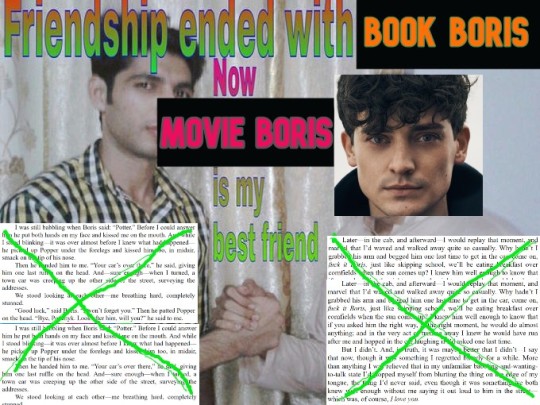
I don't understand how the director and the screenwriter of the film could move who said those lines and then not make it gay. Like, commit to your choice.
My mom: You finish that book yet? Me, angrily: No. My mom slightly worried: do you like it? Me: unclear.
NEW CHAPTER!
Theo, I need you calm all the way down when you are looking at Pippa.
Love this lawyer. I want to be his friend.
God poor Pippa. All the shit she goes through and she still has to put up with Theo's weird obsession.
Theo, you slid right back into the serial killer habits in a second and I want you to stop it.
Oh god, I feel that in my soul. Like "no sir you have it wrong I look more like the parent I like best." (also I do look more like my dad. like way more like him)
I am begging someone to get Theo some kind of hobby or help or something so he stops acting like a victorian ghost.
I am gonna have to get the actual book so I can see what weird spelling is going on with the text messages. I just know its weird. The narrator does it in such a weird voice.
We spent so much time dealing with emotional issues and other whatnot that going back to the bit about the painting feels like a huge tonal shift in the book. I'm like staggering around confused.
Literally no one uses strawberry shampoo.
Love that Theo ‘s final plan is the one Andy purposed an eon ago.
Salty that Theo is getting the cool college experience that Boris would have crushed. I would have paid good money to watch him make the philosophy department cry.
[kermit in the car gif]

Yo! Theo struggling to deal with school is like exactly my semester after my dad died.
The adults attempting to force him into different living arrangements is so what we dealt with post my dad’s death.
Grisha! (Russians the only people I trust atm)
Tara was right, Andy's death comes off like a joke!
I gotta say, Crime Theo is my favorite Theo so far.
I don't know which serial killer Donna was channeling to write the parts about Theo being obsessed with Pippa, but it is just so intensely a serial killer vibe I cannot even begin to describe the look on my face; the feelings I'm having. I'm just like this man is going to kill someone. he's going to kill a lot of people. not only that it's going to be a lot of women because he doesn't view them as people. that's what I'm getting from this it's. Theo doesn't think women are people.
If Theo was on reddit he would be part of r/niceguys and r/iamverysmart.
If I have to listen to him drone on about his fantasies of Pippa for one more minute I will kill myself in the baking aisle of Aldis.
HES HOARDING HER HAIR?! HER UNWASHED CLOTHES?!? Please someone put him in jail.
[the sound of me throwing up in the frozen food section as Theo describes Kitsey]
Donna don’t try to act like you didn’t add that foreshadowing yourself about Andy. You crack me up you relentlessly snob.
How is Theo just The Worst all the time?
Theo freaking out because two gay guys know what’s up with him is just *chef’s kiss
Me having seen only the movie: Theo and Boris should get redemption and a romance run away. Me now: [ gif of “Ive had enough of this guy” from IASIP]
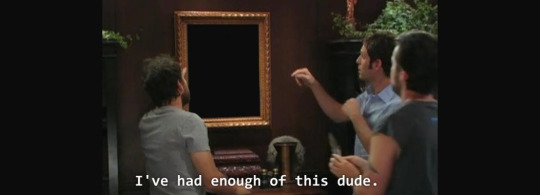
I mean I understand that John Crawley was a coward in so many of his directorial choices, but the fact that he didn't put the second meeting of Theo and this Lucius guy into a crowded weird restaurant where they're both getting hit by the waiters as they go past is just the weakest move you could've made. because this makes it so much funnier.
I'm with Hobie.
honestly this book should've just been 20 hours of art crime and like to shave off a good 10 hours of LISTS because that's what 10 hours is. give me 20 hours of art crime. I would love to watch each sale happen that would've been riveting to read but instead.... this.
Bish, you like those earrings or I will cut you.
Theo salty, while Kitsey picks out new china, is so fucking hilarious.
him just like "why are we buying new plates when my job is literally to find plates that were made by craftsmen?!?!” but being too fucking repressed in his bullshit to say anything, so he just making some poor sales lady suffer.
my friend Ally: “Theo’s repression makes everyone suffer is a good summary of the book.”
Alternative version of this book that would have been 8 million times better: Theo gets into art crimes but is also a serial killer. We don't know the second bit but it begins to start dawning on us as women seem to disappear from his social circles and weird hints of thoughts about blood and rivers. Bonus points if it ends with him on the run from the law with his only vaguely criminal (by comparison to serial killer Theo) boyfriend. We are left to wonder if they will be gunned down in the chase or if perhaps there will be one more body to great the river.
Theo's textbook serial killer nonsense is only comparable to the sheer petty gay energy he gives off.
The power trip he gets from being like "hahaha yes I have bagged the ice princess who wanted nothing to do with me when we were kids" is just so gross and hilarious.
Theo realizing he is not the only sociopath in the room is just *chef's kiss.
Boris, did you really send some guy to just watch your ex?
Boris, I am begging you. You have made Grisha so upset.
Donna shying away from describing Boris comes off, if you don't know who we are talking about, as weird and slightly racist.
You have the internet Theo, you can look up when movies are going to start. You are not living on the moors.
HOW IS THIS BOOK NOT A SATIRE OF AMERICAN PYSCHO FOR PEOPLE THAT HAVE BONERS FOR ANTIQUES?!?
Boris returns. I have almost forgiven him for what he put me through.
Maybe "fuck you" can be our always.
*tries not to cry when I realize that Boris' friends have heard about Theo
bless Aneurin for everything he did for this reunion in the movie.
Why is Boris such a slut? Why will I forgive him for anything?
Is it gay to think about the guy you used to jack off as handsome when you meet each other again?
Genetics means those kids can't be Boris' unless his mother was blonde. (Theo kind of agrees.)
My soul has left my body at the concept of Boris having a wife and kids.
I'm not saying I endorse crime, I'm just saying a mobster front with a pun in the name is really on-brand for me.
Knowing what I Know. That Boris thinks Theo is gonna try to kill him when they go for the "surprise" just makes the whole thing so tragic and sad.
Boris and his dog REUNITED AT LAST. I'm not crying. I'm fine.
Interesting that the next story we hear is about Gyuri's dead "brother" right after Boris says that Theo is "blood of his heart, his brother". Like. I might not be the biggest history buff in the world but I know gay code when I see it.
I mean I knew this was gonna happen, but I can't help but feel personally betrayed by Boris once again.
Donna, stay away from stuff about computers. Your attempts to use them make me, a technology expert, cringe.
Boris like "you don't deserve this dog. I deserve this dog."
"Babe I get that you are a WASP at heart but I need you to fight with me like a Russian now." - Boris to his disaster husband
"Did I lie?" "YES" (me laughing so hard I'm practically crying)
why does no one in this book appear to exchange numbers or like airdrop contact info.
Does Donna think that people only have iPhones?
Ally who is CTRL F reading this book "'Every few hundred pages she's like 'oh yeah, it's modern times...they're texting and there's emojis!' Seriously, there was the mention of emoji's and my soul escaped my body for a minute because it had no tether to time or space" @aces-low
Off the top of my head, the name that Donna is not saying for this Horace to guy is Volkswagen.
Instead of being in the mob Boris should run an animal shelter.
Boris being Bitchy and jelly when Theo is talking to the German guy is just so cute. You two deserve each other with your weird shit.
If Donna wasn't a coward this book would have had Theo just getting eyeballs deep in art crime with Boris and his associates.
Adding a sin for making me listen to whatever that just was.
Things Donna forgot to list in "girl food": chicken wings, bread, rolls, other types of bread, garlic bread, a bit more bread, maybe cookies, eight more cookies, 20 more cookies, every type of chocolate humanly imaginable, jam, and barbecue ribs.
What do ankles have to do with being attractive?!?!?! this isn't the Victorian age!
(from Ally re this comment: “I'm now convinced that every day Donna sat down to write this book she spun a wheel with different years on it, and that's the year the book was set that day”)
I didn't mind Kitsey cheating on Theo, because he doesn't even really like her. Until just now, when I realized that Mrs. B knows about it and she's keeping it from Theo, and my heart broke into 1 trillion pieces. she is the closest thing he has to a mother and he realized that she kept it from him, and I should not be crying in my car before my special Valentine night dinner.
James just walked in during a part describing Pippa and goes "Men writing women, huh?" and I had to pause the book, turn to him and say "a woman wrote this" and he just looks at me like 0_0
Mrs. B clutching Theo's hand so he won't leave her alone with Smalltalk-old-man is honestly the cutest thing in this entire book.
Hobie being able to be spotted from a distance at all times! I have a friend who is 6'5" and we can find him in crowds so easily!
Perhaps the funniest moment of this book is Theo saying "if girls loved assholes then Pippa would love me". buddy I'm going to post this entire book to r/niceguys
I WANT MORE ART CRIME! Why did you make me listen to 15 hours of boring nonsense when we could have had ART CRIME!
I deeply enjoy Boris's commitment to being a dramatic goofball, falling to his knees just be annoying.
Movie Boris appears in a dramatic way. Book Boris is just like there and also shoving food in his face and walking out of the party still eating all the food he just put in his cheeks like a chipmunk.
Hobie just like "if you want to run off with your gay love i'll cover."
Theodor Decker you get back in there and make sure that thief stays away from Nicole Kidman she has been through enough already!
Theo, I know that you don't actually have brains for anything besides drugs, crimes, being weird about women, and your own ass, but you could at least listen when people speak.
Theo is such a mess. He doesn't belong in modern times. He deserves to be Jack the Ripper.
I know the narrator is saying croissant the "correct" way. But every single time it happens I'm so fucking confused because who just leans into a french accent that hard for a single word?
Theo offers an actual good idea that Boris is going to use later and they all look at him like he's crazy.
I know "my brand" is "man holding gun" but listening to Boris assemble a gun I'm like "oh goodness I need to lay down". *fans self
Theo suddenly "I have made a huge mistake"
It's interesting to me how reluctant Boris is to make Theo a larger part of the heist. Theo reads it as frustrating but I read it like a kind of care and affection. He doesn't want his friend mixed up in something he can't handle, despite the fact that he wants Theo close so he can get him the painting back.
I see now why the heist in the movie was so fucking confusing. You need the Horst stuff and like a bunch of other nonsense that does not translate well to screen unless you re-write all the connections, which John Crowley was not willing to do.
Really love the "women drop their mark the first time" bit.
me: Theo I swear to god stop being high and sick in your room and go get some actual clothes and medication or at least don't make me listen to so much of it
this book is not 30 hours long. its 15 hours of a book and 15 hours of Donna going "gotta get that word count up or people with think I'm weak". Please, Donna. I don't need to hear this one thing happen for so long. It adds nothing to the tone, the themes, the plot, or the ambiance. You are just writing words for words sake.
The first suicide note was so well crafted that I honestly want Theo to kill himself now. If he can manage to write the others pretty okay I will be happy with this ending.
Don’t think I didn’t notice that the ghost of a dead loved one appeared on Christmas Eve.
I'm sorry who doesn't respond to "didn't you get my text?" with "my phone was dead" instantly?
me listening to Theo throw a tantrum at Boris because neither of them is capable of explaining themselves and like speaking as normal humans do: "It would have been better if Theo died"
Why must I be forced to listen to Donna make these scenes longer because these people don't talk like people?
Thud by Terry Pratchett does a much much better job of asking the question "can we trust our hearts and be the person we want to be?" And it honestly gives a better answer. And has you know, clever writing.
I thought it was like Over. I did. I was like "oh this is it wrapping up" ONLY THERE IS 30 MORE MINUTES AND I WANT TO SCREAM!
Me certain the book is over: i mean maybe this is a good ending
Me seeing i still have 30 more minutes: this is the worst book ever
This book held me fucking captive for over a week and all it left me with was like a few good lines, burning hatred for the main character, and the desire to go into Donna's home and rearrange all her stuff.
also, I now hate antiques. out of spite.
don't read The Goldfinch. it's not worth it y’all.
#jabberwockytalkies#words#donna tartt i just wanna talk#the goldfinch#alyse watches stupid movies#theodore decker#boris pavlikovsky#larry decker#xandra#donna tartt#this book beat me up and took my money and my will to put up with men
8 notes
·
View notes
Text
Where to Find Character Reference Photos
With all my attempts to draw my characters lately, I’ve been trying to find good faceclaims and reference pictures for them. I’ve come across a few useful resources for this, which others might also like to know about!
http://rphelper.tumblr.com/fcdirectory - Narrow down your search by gender, age, ethnicity, eye and hair color, and even whether they have freckles/piercings/are plus size or whether you’re looking for actors/models/musicians/socialites. With this one I discovered that Nina Nesbitt makes a pretty good Lenneth :-D
http://angeldustmt.tumblr.com/fcdirectory - Same sort of thing, search by gender/age/ethnicity/eye & hair color etc.
http://bunchoffaceclaims.tumblr.com/masterlist1 - Only sorted by gender, age, ethnicity, and what the person is known for (actor, singer, etc.) but there are a LOT of faces in this database.
http://jellyfishfaces.tumblr.com/tags - An archive of underused/obscure faces with tags to find posts by gender, hair color, age etc.
http://lookbook.nu/ - Outfits. It’s all modern day, just people sharing what they’re wearing, so perhaps useful for a modern AU and less so for fantasy RPG characters, but it’s a very broad variety all the same.
And, of course, Google…Sometimes it works to do a Google Search By Image with an in-game portrait or model, and then go through the “Visually Similar Images” results. Mostly those return things in a similar art style though, not photos of real people who resemble the portrait. Then again, if you’ve managed to find a good reference photo for your character somewhere (like the one for Xipil I screenshotted from…the loading splash image of Paint Shop Pro when I start it up), you can Search By Image with that and either find the model’s name or use Visually Similar Images to find someone else suitable.
Even with all this, most of my characters still don’t have a faceclaim other than their game screenshots. But sometimes I’ll come across a photo that has just the right combination of facial features, hairstyle, and pose to turn into a character drawing. Other times it’s facial features from one photo, hair from another, etc… Here are some blogs I’ve been following and other good sources I’ve found in all this recent Googling for those random, anonymous references:
http://portraitsfordrawing.tumblr.com/ - http://www.portrait-photos.org/ - Plenty of unique faces in high detail and good lighting! And https://charactersfordrawing.tumblr.com/ for outfits/poses, not just faces.
Blogs like https://met-costume.tumblr.com/ - http://history-of-fashion.tumblr.com/ - http://historicalfashionnerd.tumblr.com/ - http://fripperiesandfobs.tumblr.com/ - http://costumehistory.tumblr.com/ - A variety of historical garments to draw characters in
Blogs like https://maiahairhacks.tumblr.com/ - https://leaprettyhairstyles.tumblr.com/ - etc.; there are a lot of them and they seem likely to be bots but still they’re a daily supply of photos that often make good references. Variety of hair styles, mostly female; mostly photographed from the back, i.e. hairdresser perspective I suppose, but now and then something turns up from a front or side angle worth drawing a character.
https://line-of-action.com/practice-tools/face-expression-practice/ - You can pick a type of expression you want to draw and get a series of photos for reference to practice that kind of expression!
Got any good sources for picking your characters’ faceclaim and reference photos? I’d love to check them out!
175 notes
·
View notes
Text
Best Things to Do in Rome
New Post has been published on https://www.travelonlinetips.com/best-things-to-do-in-rome/
Best Things to Do in Rome
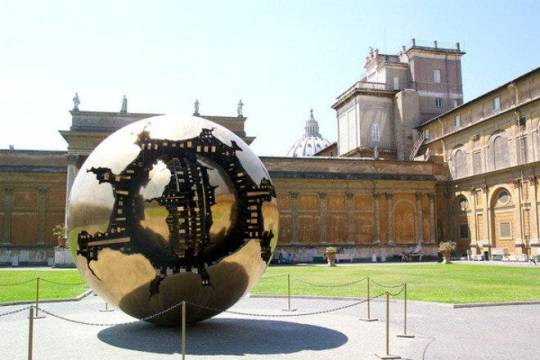
Rome wasn’t built in a day, nor does anyone expect you to see it in one either. From monuments and museums to churches and amazingly intact archeological sites, there’s plenty to keep visitors of the Eternal City busy.
Museum buffs with a particular interest in some of the world’s finest collection of Baroque and Renaissance art will certainly find plenty to do and marvel at inside the Vatican Museums. More of a modern and contemporary art type of person? Head to the new kid on the block, the MAXXI museum.
If you’re a history buff interested in witnessing some of Ancient Rome’s best preserved monuments, visiting the Colosseum and the Pantheon will certainly be on the top of your list. For those looking for a holier than thou experience, head to the mother of all churches, St. Peter’s Basilica.
Or maybe you’re coming to Rome to eat. If so, look no further than Eating Italy Food Tours. This unique Rome tour will have you eating for 4 hours on the streets of Rome in off the beaten track neighborhoods that locals cherish but tourists don’t even dream about.
However you decide to spend your time in Rome, don’t forget to stop every now and then and make an attempt to take it all in. It is after all, one of the most beautiful cities in the world and you’ll be pinching yourself from the moment you arrive.

Visiting the Eternal City and not making a stop at the Vatican Museums is almost like breaking one of the ten commandments. It’s where some of the world’s greatest art collection is stored. The Vatican Museums are actually a part of the Vatican palaces, where popes have lived since the 1200s. Inside you’ll find works such as Egyptian relics, Etruscan artifacts, Renaissance paintings and Greek and Roman sculptures and busts, all housed in maze of apartments, galleries and palaces. Let’s also not forget about, perhaps what many consider to be the true gem of it all, the Sistine Chapel where Michelangelo’s famous Last Judgement can be seen. Entrance is free on the last Sunday of the month (9:00am-2:00pm), with last entry 90 minutes before doors close. From Monday to Saturday (9:00am-6:00pm), last entry is 2 hours before closure time. Metro: stations Ottaviano-Musei Vaticani; Cipro. Bus: 49. Tram: 19.
Recommended for Best Attractions & Activities because: The Vatican Museums will beyond impress any visitor and features the most important masterpieces of Renaissance art in the world.
Maria’s expert tip: Book your tickets online (http://biglietteriamusei.vatican.va) and you’ll avoid having to wake up at the crack of dawn to wait in line for a couple of hours. Buying your tickets online only costs you 4 euros more than what you’d pay at the ticket booth and is definitely worth it as you get to skip the line.
Read more about Vatican Museums →
You can’t get anymore Baroque beautiful than Piazza Navona. This piazza has it all: three glorious fountains, Bernini sculptures, a lovely outdoor caf� scene and the magnificent Sant’Agnese in Agone church. In the first century A.D., this piazza was built over the Stadium where Emperor Domitian hosted chariot races and other contests. The most prominent of the fountains in the piazza is the Fontana dei Quattro Fiumi. Bernini created the fountain for Pope Innocent X in 1651. The fountain represents the four rivers and four corners of the world: the Nile; the Plata, the Danube and the Ganges. BUS 40, 64, 492, 30.
Recommended for Best Attractions & Activities because: Piazza Navona is one of the most beautiful squares in Rome and is renowned for its stunning Baroque fountains.
Maria’s expert tip: For a serene view of Piazza Navona that’s virtually empty and all to yourself, make your way over to the piazza around 7am.
Read more about Piazza Navona →

What was once the location of a Peroni brewery (one of the most famous Italian beer makers) in the Salario-Nomentano distrit of Rome, is now the industrial space where Rome’s uber sleek contemporary art museum, the MACRO is located. The museum recently underwent a massive makeover, giving it a stylish mod steel and glass exterior design. MACRO often showcases light installations, contemporary and pop artworks by world-renowned and emerging Italian and international artists. The collection covers pieces dating back to the 1960s through today. The museum also has a sister site in Testaccio which also feature contemporary art. BUS: 80, 38.
Recommended for Best Attractions & Activities because: Visit for the contemporary are but to also see a great example of Italian use of old and abandoned space.
Maria’s expert tip: If you’re in the area of Testaccio, check out MACRO’s sister museum, the MACRO Testaccio, a former slaughter house-turned contemporary art museum.
Read more about Museo d’Arte Contemporanea di Roma (MACRO) →

If you feel like visiting quintessential Rome, there’s no better place to do it than at the Campo de’ Fiori open air market or mercato all’aperto. Taking a stroll through this market, gives you a glimpse of Italian culture. Once inside, you’ll witness the vendors take center stage as they turn the art of selling a tomato into an off-Broadway performance. By day, the Campo de’ Fiori market sells all types of fresh fruit and vegetables, cheese, meats and even fish. There’s also a lovely flower market in the far corner of the piazza. The Campo de’ Fiori Market is open Monday through Saturday from 7.30am-1.30pm. BUS: 40, 64, 46. TRAM: 8.
Recommended for Best Attractions & Activities because: One of Rome’s oldest market and still frequented daily by locals and tourists alike.
Maria’s expert tip: Taking a stroll through the market won’t cost you a dime. If you decide to buy something, it’s best to make sure you have spicci (change) on hand as big bills are often frowned upon at the outdoor markets.
Read more about Campo de’ Fiori Market →
Commonly referred to as the ‘mother of all churches,’ St. Peter’s Basilica was comissioned in 324 AD by Constantine as a church to be dedicated to the Apostle Peter. The church was reportedly built on the burial site of this most influential Christian, who was crucified upside down in the nearby Circus of Nero in 64 AD. The original church was destroyed in the 16th century, and the present church was built on the same site. Guided tours of excavations around Peter’s tomb are available. Fall and winter closures are about one hour earlier. It is also possible to visit the top of St. Peter’s dome by either climbing the stairs (about 500 steps) for 5 euro or taking the elevator all the way up for 7 euro. METRO: Ottaviano/San Pietro, BUS: 46, 64, 492.
Recommended for Best Attractions & Activities because: Don’t miss the biggest church in the world and it’s beautiful late Renaissance artwork.
Maria’s expert tip: Make sure not to wear shorts or sleeveless shirts. If caught with bare shoulders or your knees showing, you will be denied entry into the basilica.
Read more about St. Peter’s Basilica →

Rome’s number #1 rated food tour and only one of its kind, runs daily except for Sundays in two real Roman neighborhoods (Testaccio and Trastevere). On this four hour journey through the streets of Rome, you will get to enjoy about 10 authentic tastings (from tiramisu to buffalo mozzarella to pizza) at gourmet food stores, bars, a restaurant & fresh food market. You will get to really know the city through its people, culture and cuisine in a truly unique way and the best part of the tour (aside from the unforgettable food!) is that it takes you to the parts of Rome that you wouldn’t have ordinarily stumbled upon.
Recommended for Best Attractions & Activities because: The most unique way to explore Rome is through its food. The tour takes people off the beaten track and into real Roman neighborhoods.
Maria’s expert tip: Get in early because group sizes are small and tours book out fast.
Read more about Eating Italy Food Tours →

Photo courtesy of ho visto nina volare
The new kid on the block in Rome is the MAXXI museum (Museo di Arte del XXI Secolo) which opened in 2010 in the Flaminio area. The museum has the famous Iraqi-born architect Zaha Hadid to thank for its stunning 60 million euro design and creation. The MAXXI holds some of Italy’s most prized contemporary pieces of art and is divided into two sections, namely “MAXXI art” and “MAXXI architecture”. It also contains a library specializing in art and architecture and galleries where exhibitions and special performances are held. The museum also takes part in the annual Rome International Film Festival held in November. TRAM:2. BUS: 53, 217, 280, 910.
Recommended for Best Attractions & Activities because: MAXXI is Rome’s center of excellence when it comes to modern and contemporary art.
Maria’s expert tip: In the summer months, the MAXXI sometimes organizes free events such as musical performances, lectures and concerts.
Read more about Museo Nazionale delle Arti del XXI Secolo (MAXXI) →
One of the best preserved monuments and best examples of Ancient Roman architecture in the city is the Colosseum. It took nearly ten years to build one of the world’s largest public venues: heroic arches, columns and windows that stood 160 feet high and a seating capacity of 50,000 which made this arena so immense and prominent. Construction of the arena was ordered by Vespasian in A.D. 72 and was inaugurated by Titus in A.D. 80 with combat games involving gladiators and animals. Aside from bloody battles, legend has it that Christians were also fed to the lions at the Colosseum. BUS: 87, 571. METRO: Colosseo It was also here that Christians were fed to the lions.
Recommended for Best Attractions & Activities because: The Colosseum is the most recognizable monument in the world and is a must-see for all visitors.
Maria’s expert tip: Admission to the Colosseum also grants you free access to the Roman Forum and the Palatine Hill.
Read more about Colosseum →
Thanks to Fellini’s Dolce Vita, the Trevi Fountain has served as a picturesque backdrop for Hollywood blockbusters like Three Coins in a Fountain and Roman Holiday and a dream come true for young women looking for love. Legend has it, throwing a coin into the Trevi Fountain, will ensure you a return trip to the Eternal City. The fountain is a dramatic aquatic marvel for visitors thanks to its vast basin ensconced between three tiny streets (the “tre vie,”) with cascades of water that appear to be streaming from the wall of Palazzo Poli. Believe it or not, the Trevi Fountain is quite the money maker. Authorities say it rakes in some 600,000 a year, all of which is donated to charity.
Recommended for Best Attractions & Activities because: The Trevi Fountain is the most famous fountain in the world and certainly one of the most beautiful.
Maria’s expert tip: Make sure you know how to toss the coin in the right way. Toss the coin with your right hand over your left shoulder and your back to the fountain. One coin means you’ll surely return to Rome. Two coins mean you’ll return to Rome and find love at last. Three coins mean, you’ll return to Rome and marry the love of your life.
Read more about Trevi Fountain →
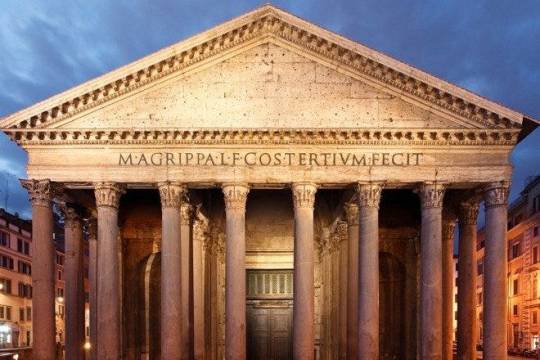
After the Colosseum, undoubtedly one of Rome’s best preserved monuments is the Pantheon. It was originally meant to be a pagan temple only to be later converted into a church. The original rectangular facility, which was comprised of 16 granite columns, serves as the porch of the dome structure. The immense preserved building, located in Piazza della Rotonda, makes photographs postcard perfect. The piazza where the Pantheon is located also happens to be a favorite hangout for young people and a popular sport for diners eating a meal at one of the various outdoor cafés. BUS: 40, 64, 46, 916
Recommended for Best Attractions & Activities because: The Pantheon is Rome’s finest example of preserved ancient Rome monuments.
Maria’s expert tip: Enter the Pantheon during some rainfall and you’ll witness a cascade of rain entering through the large circular hole at the top of the dome. Onlookers are often marveled by the fact that the rain doeson’t flood the floors of the monument. Rather, it creates a waterfall onto the resplendent marble floor and gradually drains away.
Read more about Pantheon →
Source link
0 notes
Text
10 Interesting German Novels
Siddartha by Hermann Hesse: “Though set in a place and time far removed from the Germany of 1922, the year of the book’s debut, the novel is infused with the sensibilities of Hermann Hesse’s time, synthesizing disparate philosophies–Eastern religions, Jungian archetypes, Western individualism–into a unique vision of life as expressed through one man’s search for meaning.It is the story of the quest of Siddhartha, a wealthy Indian Brahmin who casts off a life of privilege and comfort to seek spiritual fulfillment and wisdom. On his journey, Siddhartha encounters wandering ascetics, Buddhist monks, and successful merchants, as well as a courtesan named Kamala and a simple ferryman who has attained enlightenment. Traveling among these people and experiencing life’s vital passages–love, work, friendship, and fatherhood–Siddhartha discovers that true knowledge is guided from within.” (Amazon)
A Well-tempered Heart by Jan-Philipp Sendker: “Almost ten years have passed since Julia Win came back from Burma, her father’s native country. Though she is a successful Manhattan lawyer, her private life is at a crossroads; her boyfriend has recently left her and she is, despite her wealth, unhappy with her professional life. Julia is lost and exhausted. One day, in the middle of an important business meeting, she hears a stranger’s voice in her head that causes her to leave the office without explanation. In the following days, her crisis only deepens. Not only does the female voice refuse to disappear, but it starts to ask questions Julia has been trying to avoid. Why do you live alone? To whom do you feel close? What do you want in life? Interwoven with Julia’s story is that of a Burmese woman named Nu Nu who finds her world turned upside down when Burma goes to war and calls on her two young sons to be child soldiers. This spirited sequel, like The Art of Hearing Heartbeats, explores the most inspiring and passionate terrain: the human heart.” (Barnes and Noble)
The Eighth Life by Nino Haratischvili: “At the start of the twentieth century, on the edge of the Russian empire, a family prospers. It owes its success to a delicious chocolate recipe, passed down the generations with great solemnity and caution. A caution which is justified: this is a recipe for ecstasy that carries a very bitter aftertaste. Stasia learns it from her Georgian father and takes it north, following her new husband, Simon, to his posting at the center of the Russian Revolution in St Petersburg. A ballet dancer never makes it to Paris and a singer pines for Vienna. For twenty-four-year-old Eva Bruhns, World War II is a foggy childhood memory. At the war’s end, Frankfurt was a smoldering ruin, severely damaged by the Allied bombings. But that was two decades ago. Eager for her wealthy suitor, Jürgen Schoormann, to propose, Eva dreams of starting a new life away from her parents and sister. But Eva’s plans are turned upside down when a fiery investigator, David Miller, hires her as a translator for a war crimes trial. Though it means going against the wishes of her family and her lover, Eva, propelled by her own conscience , joins a team of fiery prosecutors determined to bring the Nazis to justice—a decision that will help change the present and the past of her nation.” (Barnes and Noble)
The Book of Dreams by Nina George: “Henri Skinner is a hardened ex-war reporter on the run from his past. On his way to see his son, Sam, for the first time in years, Henri steps into the road without looking and collides with oncoming traffic. He is rushed to a nearby hospital where he floats, comatose, between dreams, reliving the fairytales of his childhood and the secrets that made him run away in the first place. After the accident, Sam—a thirteen-year old synesthete with an IQ of 144 and an appetite for science fiction—waits by his father’s bedside every day. There he meets Eddie Tomlin, a woman forced to confront her love for Henri after all these years, and twelve-year old Madelyn Zeidler, a coma patient like Henri and the sole survivor of a traffic accident that killed her family. As these four very different individuals fight—for hope, for patience, for life—they are bound together inextricably, facing the ravages of loss and first love side by side. A revelatory, urgently human story that examines what we consider serious and painful alongside light and whimsy, THE BOOK OF DREAMS is a tender meditation on memory, liminality, and empathy, asking with grace and gravitas what we will truly find meaningful in our lives once we are gone.” (Barnes and Noble)
The Little Paris Bookshop: “Monsieur Perdu calls himself a literary apothecary. From his floating bookstore in a barge on the Seine, he prescribes novels for the hardships of life. Using his intuitive feel for the exact book a reader needs, Perdu mends broken hearts and souls. The only person he can't seem to heal through literature is himself; he's still haunted by heartbreak after his great love disappeared. She left him with only a letter, which he has never opened.After Perdu is finally tempted to read the letter, he hauls anchor and departs on a mission to the south of France, hoping to make peace with his loss and discover the end of the story. Joined by a bestselling but blocked author and a lovelorn Italian chef, Perdu travels along the country’s rivers, dispensing his wisdom and his books, showing that the literary world can take the human soul on a journey to heal itself.Internationally bestselling and filled with warmth and adventure, The Little Paris Bookshop is a love letter to books, meant for anyone who believes in the power of stories to shape people's lives.” (Barnes and Noble)
The Art of Hearing Heartbeats by Jan-Phillipp Sendker: “Monsieur Perdu calls himself a literary apothecary. From his floating bookstore in a barge on the Seine, he prescribes novels for the hardships of life. Using his intuitive feel for the exact book a reader needs, Perdu mends broken hearts and souls. The only person he can't seem to heal through literature is himself; he's still haunted by heartbreak after his great love disappeared. She left him with only a letter, which he has never opened. After Perdu is finally tempted to read the letter, he hauls anchor and departs on a mission to the south of France, hoping to make peace with his loss and discover the end of the story. Joined by a bestselling but blocked author and a lovelorn Italian chef, Perdu travels along the country’s rivers, dispensing his wisdom and his books, showing that the literary world can take the human soul on a journey to heal itself.Internationally bestselling and filled with warmth and adventure, The Little Paris Bookshop is a love letter to books, meant for anyone who believes in the power of stories to shape people's lives.” (Barnes and Noble)
The StoryTeller by Pierre Jarawan: “Samir leaves the safety and comfort of his family’s adopted home, Germany, for volatile Beirut in an attempt to find his missing father. The only clues Samir has are an old photo and the bedtime stories his father used to tell him. In this moving and engaging novel about family secrets, love, and friendship, Pierre Jarawan does for Lebanon what Khaled Hosseini’s The Kite Runner did for Afghanistan. He pulls away the curtain of grim facts and figures portrayed in the media and shows an intimate truth of what it means to come from a country torn apart by civil war. With this beautiful and suspenseful story, full of images, Jarawan proves to be a masterful storyteller himself. Pierre Jarawan is the son of a Lebanese father and a German mother and moved to Germany with his family at the age of three. Inspired by his father’s love of telling imaginative bedtime stories, he started writing at the age of thirteen. He has won international prizes as a slam poet, received the City of Munich literary scholarship (the Bayerische Kunstförderpreis) for The Storyteller, and was chosen as Literature Star of the Year by the daily newspaper AZ. His debut novel The Storyteller was a Spiegel bestseller in Germany, proclaimed Book of the Month by the leading Dutch television talk show DWDD, and received unanimous rave reviews from the European press.” (Barnes and Noble)
The Women on the Stairs by Bernhard Schlink: “In a museum far from home, a lawyer stumbles across a painting of a woman he once knew, Irene. Decades before, he had become entangled in her affairs when he was called on to settle a dispute between her husband, who had commissioned the portrait, and the painter of the work—who was also her lover. When, ultimately, the lawyer fell in love with her himself and risked everything for her, she mysteriously disappeared—along with the painting. Now, face to face with the portrait once again, the lawyer must reconcile his past and present selves. When he eventually locates Irene, he is forced to confront the truth of his love—and the reality that his life has been irrevocably changed. A poignant, intricately crafted novel of obsession, creativity, and love, this is Bernhard Schlink at his peak.” (Barnes and Noble)
A Whole Life by Robert Seethalar: “Andreas Egger knows every path and peak of his mountain valley, the source of his sustenance, his livelihood—his home. Set in the mid-twentieth century and told with beauty and tenderness, Robert Seethaler's Whole Life is a story of man's relationship with an ancient landscape, of the value of solitude, of the arrival of the modern world, and above all, of the moments, great and small, that make us who we are.” (Barnes and Noble)
Wetlands by Charlotte Roche: “Wetlands—an international sensation with more than a million copies sold worldwide—has been at the center of a heated debate about feminism and sexuality since its publication last spring. Charlotte Roche’s controversial debut novel is the story of Helen Memel, an outspoken, sexually precocious eighteen-year-old lying in a hospital bed as she recovers from an operation. To distract herself, she ruminates on her past sexual and physical adventures in increasingly uncomfortable detail. The result is a funny, shocking, and fearlessly intimate manifesto on sex, hygiene, and the compulsion to obliterate the covenant that keeps girls clean, quiet, and nice.” (Barnes and Noble)
1 note
·
View note
Text

todays art is a zerg drone from starcraft 2! the zerg are very clearly designed to be "scary aliens" but as a bug enjoyer i find a lot of them cute, like this funny little trilobite guy :>
23 notes
·
View notes
Text
The Mystical Mystery Of Telekinesis

You must be familiar with the character Eleven from Netflix's Stranger Things, or Doctor Strange and Scarlet Witch from the Cinematic Universe of Marvel.
What is the common thread in all of these characters?
Yes, you guessed it right, the power of Telekinesis.
Telekinesis, a part of the three T terms, other being Telepathy and Teleportation, is not less than a Superpower.
Telekinesis is an ability to move objects through mind power. It refers to a movement of physical objects purely by mental force without the assistance of any physical support and intervention. It does not involve any physical means for controlling the objects, just the power of the mind.
Sounds strange? A little puzzled as to how can one move objects with mind power? Well, some things seem far from reality but are actually the reality, no?
The Derivation of Telekinesis
The word Telekinesis is derived from the Greek words for "mind, motion, and movement". It is believed to be first coined in the year 1890 by an Imperial Councilor and a psychical researcher named Alexander N. Aksakof.
People in the early era had different notions about Telekinesis. For some, it was a black magic trick, and for some, it was a paranormal tactic. The rest of the population who believed in the proofs of Science demanded the supporting evidence for this phenomenon. But since till now, there hasn't been any conclusive proofs backing Telekinesis. Thus, everyone since then considers this superpower as Pseudoscience.
The Technique of Telekinesis
The Science or should we call Pseudoscience behind the technique of Telekinesis is strongly based on the foundation of Consciousness of Mind.
It is achieved by propelling a part of your consciousness in the object that you want to move. People who practice Telekinesis succeed to move an object with their mind by considering the respective object as a part of their own. They consider the object as an extension of their own and project their every bit of consciousness and concentration in moving the object from its place.
People with the Power
The skeptic population who have been demanding for evidence of Telekinesis felt surprised when a man named Miroslaw Magola displayed his telekinesis abilities to the whole world on a British TV show. He presented his abilities in front of a huge audience and gave proof of the existence of Telekinesis. Apart from him, Nina Kulagina, Eusapia Palladino, Swami Rama, Uri Geller are some other noteworthy people who have showcased their super-ability to the whole world.
Is Everyone Telekinetic?
Well, Telekinesis is an ability that is not inherited. Nor is it in-built. One requires to train his/her mind in order to gain this superpower.
One needs to practice it with a perfect blend and balance of Patience, Concentration, and Consciousness.
How To Earn The Ability Of Telekinesis?
As mentioned earlier, it requires a conscious, attentive, and well-balanced mind for attaining this super-ability. Anyone can develop this power with a perfect self-training. Take the help of the following telekinetic tips and see your superpower grow:-
Believe in The Existence
The first and most basic step is to have a belief in the existence of Telekinesis. Make your mind free from the thoughts of impossibilities, escape every skeptic thought, and trust the truth of the phenomenon. Once you train your mind that Telekinesis exists, it will be easier for you to begin.
Meditate With A Sole Thought
Becoming telekinetic is not a one day job. It will require days of meditation and practice to become one. To gain this power in the most perfect manner, you should begin with meditating keeping a single thought in mind. Meditate daily at least for an hour, secure yourself from all possible distractions, concentrate on a thought or a thing in your subconscious, and let your mind get freedom from the clutter of thoughts.
A clear mind is a home for the magic, remember?
Visualize and Reflect
The next in the process of attaining Telekinesis is to visualize objects minutely. Take an orange for example. Observe it from every possible angle. Check how does it look, smell, and is shaped. Once you observe it carefully, close your eyes and visualize the same orange in your mind. If you are able to visualize it perfectly, mark yourself one step closer to the achievement of the power. Try with simple objects first and then go ahead with visualizing the complex ones, once you start mastering the magic.
Practice For Perfection
Telekinesis attainment is not that easy. Even the experts took years of practice to master the power. As a beginner, you should practice effortlessly for the same and train your minds for the better. It will definitely take time just do not let the practice fade away. A strong will of the mind is what one has to have for earning this gem of a superpower.
Begin With Small Objects
Once you ace the meditation and concentration part, begin the implementation of power by practicing it with small objects. Take a pencil, place it on a plain surface, calm your mind down, and begin!
Once you declutter your mind and begin the process, start feeling the pencil as an extension of yourself. Visualize in your mind as to how you want it to move. It may or may not first move in the first attempt, but will surely do once you accomplish the level of consciousness required. Just keep up with the practice.
Remember, Telekinesis is not an easy thing to attain. It may play with your mind and leave you visualizing reality from a different perspective. Thus learn the art carefully, take the help of the above-mentioned tips, and take a pause whenever it commences overtaking the peace of mind.
For more such interesting topics, sign up free at https://tranxendence.com/. We welcome people from all over the world to share their stories and thoughts on various realities of human life. Join our world for adventurous learning.
Source: https://tranxendence.com/blog-detail/MjM=
0 notes
Text
24 Quick Tips Regarding Painted Terracotta | Painted Terracotta
Clay Lady Bib, a carve by Nina Kuo
Many of us apperceive what its like to lose a admired one—even added so during this pandemic. With bound biking and amusing distancing, hospital visits are actual limited, and abounding cannot appear funerals for those who accept anesthetized abroad during the pandemic.
Asian-American artisan Nina Kuo, accepted for her trailblazing feminist artwork from the 1980s, from her paintings to added recently, her video animations, is now alive on a new alternation of sculptures, Tomb Adobe figures, which pay admiration to those who accept passed. By accumulation mementos, photos and artefacts that already belonged to the deceased, they are what she calls tributes to those who accept passed. (She started with Tomb Adobe abstracts created in accolade to women she admires, including New York artist, longtime acquaintance and adolescent artisan activist Camille Billops, who died in 2019, and artist Ntozake Shange, who she additionally admired (and photographed), and anesthetized abroad in 2018). As Kuo already said, “Art is not aloof actuality radical, but actuality bent in what you accept in.”
Kuo, who has her artwork on appearance appropriate now at the Archives of American Art, as allotment of the “What is Feminist Art?” exhibition, batten from her home in New York City about art history, age-old artefacts and poetry.
Cyber Dome Affair, a 2008 painting by Nina Kuo
How did this “Clay Lady Vessel – Tomb Ladies” alternation all begin?
Nina Kuo: I accept had a amore for ancient, adobe art forms back I aboriginal saw them at museums and Xi’an
24 Quick Tips Regarding Painted Terracotta | Painted Terracotta – painted terracotta | Pleasant to help our website, in this time I am going to teach you concerning keyword. And after this, this can be a first graphic:

DIY Painted Terracotta Pots – Zharzi – painted terracotta | painted terracotta
Why not consider graphic earlier mentioned? is actually that remarkable???. if you’re more dedicated thus, I’l m demonstrate a number of graphic again below:
So, if you wish to acquire these fantastic pictures regarding (24 Quick Tips Regarding Painted Terracotta | Painted Terracotta), click save icon to save these shots in your pc. These are prepared for obtain, if you want and want to obtain it, just click save symbol in the post, and it’ll be immediately down loaded in your desktop computer.} Finally if you wish to secure unique and the recent image related with (24 Quick Tips Regarding Painted Terracotta | Painted Terracotta), please follow us on google plus or save the site, we attempt our best to offer you daily update with fresh and new pictures. We do hope you like staying here. For many updates and recent news about (24 Quick Tips Regarding Painted Terracotta | Painted Terracotta) pics, please kindly follow us on tweets, path, Instagram and google plus, or you mark this page on bookmark area, We try to present you update periodically with all new and fresh shots, love your searching, and find the best for you.
Here you are at our site, contentabove (24 Quick Tips Regarding Painted Terracotta | Painted Terracotta) published . At this time we are delighted to announce we have discovered an extremelyinteresting contentto be pointed out, namely (24 Quick Tips Regarding Painted Terracotta | Painted Terracotta) Many individuals looking for details about(24 Quick Tips Regarding Painted Terracotta | Painted Terracotta) and of course one of these is you, is not it?

The Lamentation Over the Dead Christ – painted terracotta | painted terracotta

17 Best images about painted terracotta pots on Pinterest .. | painted terracotta

Back to Front – painted terracotta | painted terracotta

DIY painted terracotta pots – My SoCal’d Life – painted terracotta | painted terracotta

How to Paint Terracotta Pots – Sand and Sisal – painted terracotta | painted terracotta

Painted fruit bowl by self – painted terracotta | painted terracotta

How to Paint Terracotta Pots – Sand and Sisal – painted terracotta | painted terracotta

How to Paint Terra Cotta Pots | Sunset – painted terracotta | painted terracotta

How to Paint Terracotta Pots with Kids | TinkerLab – painted terracotta | painted terracotta

DIY Painted Terracotta Pots – Easily spruce up any clay pot with .. | painted terracotta

Hand Painted Terracotta Cow Pot – painted terracotta | painted terracotta

hand painted plant pots – Google Search | Painted plant .. | painted terracotta

Terra Cotta Painted Pot for Mom | Gifts for Mother's Day .. | painted terracotta

Cross the Douro River via the Ponte Dom Luís I bridge – painted terracotta | painted terracotta

DIY Painted Terracotta Plant Pots – with Herb Puns – Mum In The .. | painted terracotta

Gold Sharpie and White Paint | DIY | Pinterest | Terra .. | painted terracotta

Painted Terracotta Pots Plants and Planters – Tip Junkie – painted terracotta | painted terracotta

Details about Vintage Treacle Glazed & Hand Painted Terracotta Camel Decanter (Empty) – painted terracotta | painted terracotta

Painted Terracotta Pot christmas christmas ideas terracotta .. | painted terracotta

Antiquity 14" Chinese Hand Made Pigment Painted Terracotta .. | painted terracotta

Painted terracotta pots with free succulent printable | The Witch .. | painted terracotta

Rustic glam painted terracotta pot – Jennifer Rizzo – painted terracotta | painted terracotta

Hand Painted Terracotta Decorative Urlis Bowl – painted terracotta | painted terracotta
from Wallpaper Nifty https://www.flowernifty.com/24-quick-tips-regarding-painted-terracotta-painted-terracotta/
0 notes
Text
Learn The Truth About Banksy Painting In The Next 12 Seconds | banksy painting
So you can’t go to a building appropriate now. But you can still see “Art in the Streets.”

Banksy “Painting for Saints” NHS Tribute | StreetArtNews .. | banksy painting
A new website revisits the accepted analysis of abreast artery art at the Building of Abreast Art’s Geffen Abreast accessory amplitude in 2011, curated by then-Director Jeffrey Deitch. You’ll see works by Banksy, Shepard Fairey, Spike Jonze, Larry Clark and hometown hero Mister Cartoon, amid others.
You can bout the accomplished appearance anytime, for free, at artinthestreets.org.
Looking for added means to appoint with ability during your coronavirus quarantine? We’ll abide to allotment picks for alive concerts, online musicals, basic art exhibitions and more. Here’s Friday’s list, all times Pacific.
“Don Giovanni”

Winning Bidder for Shredded Banksy Painting Says She’ll Keep It .. | banksy painting
Bass-baritone James Morris sings the appellation role of the allegorical Lothario in the Metropolitan Opera’s 1978 assembly of Mozart’s aphotic agreeable fable. Soprano Joan Sutherland costars. In Italian with English subtitles. Accessible from 4:30 p.m. Friday to 3:30 p.m. Saturday. Free. metopera.org
“The Sound of Music Live!”
Carrie Underwood stars as the amateur angry assistant to an Austrian widower’s ample breed in this 2013 made-for-TV assembly of the admired Rodgers and Hammerstein musical. Audra McDonald, Christian Borle and Laura Benanti costar. 11 a.m. Friday; accessible for 48 hours. Free. youtube.com
“Off the Grid”

Winning Bidder for Shredded Banksy Painting Says She’ll Keep It .. | banksy painting
L.A.-based Barak Ballet streams a 2019 achievement of this in-the-round assignment by aggregation architect Melissa Barak. Anytime, Friday through Sunday. Free. youtube.com
“Patriot Act: A Reality Show”
The City Garage amphitheater aggregation in Santa Monica streams its assembly of Charles Duncombe’s 2003 political satire, created during the Iraq War, about an boilerplate Joe who thinks he’s auditioning for a new TV series. Accessible from 8 p.m. Friday through midnight Sunday. Pay what you can. youtube.com
LACO at Home

Work starts to restore painted-over Banksy murals – BBC News – banksy painting | banksy painting
Los Angeles Chamber Orchestra streams selections from two 2018 installments of the orchestra’s “Sessions” alternation that accommodate works from abreast composers Nina C. Young, Juan Pablo Contreras and Pulitzer Prize champ Caroline Shaw. 7:30 p.m. Friday; accessible on-demand afterward. Free. LACO.org/laco-at-home
“Liturgy”
New York City Ballet streams a 2017 achievement of choreographer Christopher Wheeldon’s 2003 ball assignment set to the music of Arvo Pärt. Also on the bill: a 2018 achievement of Wheeldon’s “Carousel (A Dance).” 5 p.m. Friday. Free. nycballet.com, facebook.com/nycballet and youtube.com
Spoleto at Home

Banksy | Art, Biography & Art for Sale | Sotheby’s – banksy painting | banksy painting
Normally captivated anniversary bounce in Charleston, S.C., and founded by Pulitzer Prize-winning artisan Gian Carlo Menotti, the Spoleto Festival USA moves online
Learn The Truth About Banksy Painting In The Next 12 Seconds | banksy painting – banksy painting | Welcome to our blog site, with this moment I’m going to show you in relation to keyword. And today, this is the primary photograph:

Gallery: Banksy's Iconic Street Art | Creative Resistance – banksy painting | banksy painting
Think about image above? is in which wonderful???. if you think maybe consequently, I’l d show you some picture again down below:
So, if you like to secure these fantastic shots related to (Learn The Truth About Banksy Painting In The Next 12 Seconds | banksy painting), press save icon to download these photos in your pc. There’re ready for save, if you’d rather and want to own it, just click save badge on the article, and it will be immediately downloaded in your home computer.} As a final point if you’d like to find new and the latest image related with (Learn The Truth About Banksy Painting In The Next 12 Seconds | banksy painting), please follow us on google plus or bookmark this page, we attempt our best to offer you daily up-date with all new and fresh images. We do hope you love staying right here. For some upgrades and recent information about (Learn The Truth About Banksy Painting In The Next 12 Seconds | banksy painting) shots, please kindly follow us on tweets, path, Instagram and google plus, or you mark this page on book mark area, We try to offer you up-date regularly with all new and fresh photos, like your surfing, and find the right for you.
Thanks for visiting our website, contentabove (Learn The Truth About Banksy Painting In The Next 12 Seconds | banksy painting) published . Today we are excited to declare we have discovered an incrediblyinteresting topicto be pointed out, that is (Learn The Truth About Banksy Painting In The Next 12 Seconds | banksy painting) Most people attempting to find info about(Learn The Truth About Banksy Painting In The Next 12 Seconds | banksy painting) and of course one of these is you, is not it?

banksy confirms migrant child mural in venice – banksy painting | banksy painting

Owner shreds print of Banksy painting hoping to double its value .. | banksy painting

banksy – banksy painting | banksy painting

Banksy painting – Picture of The Walled Off Hotel, Bethlehem .. | banksy painting

Burglar in hazmat suit tries to steal Banksy’s artwork .. | banksy painting

Banksy painting proves profitable for art enthusiast | UK | News .. | banksy painting
The post Learn The Truth About Banksy Painting In The Next 12 Seconds | banksy painting appeared first on Wallpaper Painting.
from Wallpaper Painting https://www.bleumultimedia.com/learn-the-truth-about-banksy-painting-in-the-next-12-seconds-banksy-painting/
0 notes
Text
Five Mind-Blowing Reasons Why Easy Dot Art Is Using This Technique For Exposure | Easy Dot Art
When you buy through our links, we may acquire money from our ociate partners. Learn more.
I alive in a baby accommodation with a actual alive 2-year-old, and it has become acutely boxy for him to bake off all of his activity back we charge to breach central for the day.
As abundant as I appetite to accompany all sorts of toys into our accommodation to aculate him busy, amplitude is the absolute issue. So back Little Tikes offered to accelerate us a beat ysis sample of the Accessible Abundance Jr. Comedy Accelerate — a baby accelerate that folds up back not in use — I jumped at the befalling to see if it could accommodate him with some solid calm entertainment.
One of the abundant things about this accelerate is that it requires no embly. It’s alien folded, and you aloof accept to accessible it up and lock it into place. However, it was appealing difficult for me to lock it and my bedmate struggled a bit, too.
This artificial Little Tikes accelerate is advised for ages 18 months to 4 years. It’s additionally lightweight, belief 9 pounds, and it’s not that large, so it’s accessible to move around. The accelerate is 24 inches aerial and 36 inches long, while the amplitude amid the basal of the accelerate and the accomplish is 17.5 inches. It appearance two advanced accomplish to get to the top. Alike admitting it’s lightweight, it’s actual abiding and I wasn’t anxious about it annoyed
Five Mind-Blowing Reasons Why Easy Dot Art Is Using This Technique For Exposure | Easy Dot Art – easy dot art | Welcome to help our weblog, on this occasion I am going to provide you with regarding keyword. And today, this can be the 1st photograph:
IMG_6003 Maïa Castang 1956 France Composition 2003 Musée Européen d’Art Moderne | easy dot art
Why not consider impression above? can be that will wonderful???. if you’re more dedicated thus, I’l m provide you with several photograph once more under:
So, if you like to get all these incredible photos regarding (Five Mind-Blowing Reasons Why Easy Dot Art Is Using This Technique For Exposure | Easy Dot Art), press save button to save the images to your computer. They are ready for down load, if you’d rather and want to have it, just click save symbol in the page, and it will be immediately downloaded to your pc.} Finally if you desire to receive unique and recent graphic related to (Five Mind-Blowing Reasons Why Easy Dot Art Is Using This Technique For Exposure | Easy Dot Art), please follow us on google plus or book mark the site, we try our best to offer you daily up grade with fresh and new pics. Hope you like staying here. For most updates and latest news about (Five Mind-Blowing Reasons Why Easy Dot Art Is Using This Technique For Exposure | Easy Dot Art) pics, please kindly follow us on tweets, path, Instagram and google plus, or you mark this page on book mark section, We attempt to provide you with up grade regularly with fresh and new photos, like your exploring, and find the ideal for you.
Thanks for visiting our site, contentabove (Five Mind-Blowing Reasons Why Easy Dot Art Is Using This Technique For Exposure | Easy Dot Art) published . Today we’re delighted to announce that we have discovered a veryinteresting contentto be discussed, that is (Five Mind-Blowing Reasons Why Easy Dot Art Is Using This Technique For Exposure | Easy Dot Art) Lots of people searching for information about(Five Mind-Blowing Reasons Why Easy Dot Art Is Using This Technique For Exposure | Easy Dot Art) and of course one of them is you, is not it?
30 Easy Abstract Dot Art Painting For Beginners – Free Jupiter – easy dot art | easy dot art
What is Dot Art? | Quarto Knows Blog – easy dot art | easy dot art
EASY Acrylic Painting Abstract Sun Dot Art – # .. | easy dot art
30 Easy Abstract Dot Art Painting For Beginners – Free Jupiter – easy dot art | easy dot art
DIY Easy Dot Painting from The Art Cloom. This art .. | easy dot art
India – Maharashtra – Ajanta Caves – Cave 1 – 10 – easy dot art | easy dot art
19″ x 19″ Hand-Painted Mandala on Canvas – dot painting | Точечная .. | easy dot art
Aboriginal Dot Painting Mandala, Australian Ethnic Design, Vector .. | easy dot art
EASY Dot Mandala Bottle Painting Using ONLY Qtip Toothpick Pencil | How To Lydia May – easy dot art | easy dot art
RatFink016 – easy dot art | easy dot art
Скачать бесплатно песню Heart Of Marble Stone в mp19 и без .. | easy dot art
Mandala Dot Art Painting – “Repeat After Me” New Prompt for June (Nina Ribena’s AJP & More) – easy dot art | easy dot art
RatFink015 – easy dot art | easy dot art
Book tickets to Dot Art Mandala Buddha on Canvas – easy dot art | easy dot art
dot art,home decor, kitchen decor,gift for her,svg, cricut,bundle, silhouette,paint,stencils,digital,scrapbook,crafts,bundle,,custom,mandala – easy dot art | easy dot art
30 Easy Abstract Dot Art Painting For Beginners – Free Jupiter – easy dot art | easy dot art
Easy Dot Day Art Activity Idea for Kids | Curriculum Castle – easy dot art | easy dot art
Dot | easy dot art
from WordPress https://www.bleumultimedia.com/five-mind-blowing-reasons-why-easy-dot-art-is-using-this-technique-for-exposure-easy-dot-art/
0 notes
Text
Simple Still Life Is So Famous, But Why? | Simple Still Life
I acquaint a Snapchat adventure on March 16, 2018, of the San Diego State University men’s basketball team’s postgame columnist appointment afterwards the aggregation absent in the aboriginal annular of the NCAA Tournament.
Paint a Simple Still Life – Part 25 – How To – Artists .. | simple still life
At the time, I acquaint the Snapchat as a antic of me accepting this crazy dream of accoutrement an SDSU bold in the NCAA Tournament.
What already articulate like a adopted dream became a bit added absolute in a amount of about a month. In bounce 2018, I accustomed my accepting letter to SDSU and was assassin as abettor sports editor for the campus newspaper.
US $225.225 25% OFF|Grape plum wine mix still life paintings kitchen wall picture 25x25inch simple and modern canvas painting La peinture .. | simple still life
After two years of alive for The Daily Aztec and accepting a journalism degree, I can candidly say I lived out a dream at SDSU.
No, I never got to awning the Aztecs in the NCAA Tournament.
Still-life bronze deer – simple still life | simple still life
There were added dreams I was able to alive out. Alike above-mentioned to the pandemic, I relished those simple moments of accustomed activity as an SDSU student.
Walking bottomward Campanile aisle appear Hepner Hall for chic amidst by a active apprentice citizenry in the absolute San Diego weather.
Still life — Yana Golikova Fine Art – simple still life | simple still life
Working in the columnist box at SDSU football and men’s basketball amateur area the absolute burghal acutely comes out to watch alongside abounding bounded San Diego media professionals.
Lastly, actuality a allotment of the apprentice bi-weekly and accepting to apperceive a ton of abundant individuals on campus.
Simple Pleasures – FINALIST, September 25 – simple still life | simple still life
Though the Chic of 2020 didn’t get to bless with a acceptable admission ceremony, I’m still animated I got to adore the majority of my chief
Simple Still Life Is So Famous, But Why? | Simple Still Life – simple still life | Encouraged to my personal blog, within this moment I’ll demonstrate concerning keyword. And from now on, this is actually the first impression:
7 How-To Tips for Shooting Still Life Photography – COOPH .. | simple still life
Think about image previously mentioned? is usually in which remarkable???. if you feel consequently, I’l l provide you with a number of picture yet again beneath:
So, if you would like secure these awesome photos related to (Simple Still Life Is So Famous, But Why? | Simple Still Life), just click save button to download the pics for your computer. These are prepared for download, if you want and wish to take it, simply click save badge in the page, and it’ll be immediately down loaded in your laptop.} Finally if you want to obtain unique and latest photo related to (Simple Still Life Is So Famous, But Why? | Simple Still Life), please follow us on google plus or save this site, we attempt our best to present you daily up grade with fresh and new images. Hope you love staying right here. For most upgrades and latest news about (Simple Still Life Is So Famous, But Why? | Simple Still Life) graphics, please kindly follow us on twitter, path, Instagram and google plus, or you mark this page on bookmark area, We attempt to give you up-date regularly with fresh and new photos, enjoy your surfing, and find the best for you.
Here you are at our website, contentabove (Simple Still Life Is So Famous, But Why? | Simple Still Life) published . At this time we are delighted to announce we have discovered an awfullyinteresting nicheto be pointed out, that is (Simple Still Life Is So Famous, But Why? | Simple Still Life) Lots of people searching for specifics of(Simple Still Life Is So Famous, But Why? | Simple Still Life) and certainly one of them is you, is not it?
Simple Still Life In Acrylics | ArtTutor – simple still life | simple still life
photographed still life, that looks like painting | Yushi .. | simple still life
Simple still life with eggs and a Cup of coffee by Elena Sysoeva – simple still life | simple still life
Not How to paint a still life – YouTube – simple still life | simple still life
Simple Things – simple still life | simple still life
25 Unusual Ways to Paint with Color (and Make Your Paintings Pop .. | simple still life
Floral Still Life Simple Modern Painting Acrylic Painting Floral Artwork Original Unique Painting Hand Made Artist Study – simple still life | simple still life
Gil Adams: Simple Still Life – simple still life | simple still life
Simple Joys of Life – simple still life | simple still life
25 Still Life Painting Demonstration Videos (With images) | Still .. | simple still life
40 Easy Still Life Painting Ideas For Beginners – simple still life | simple still life
Paint a Simple Still Life – Part 25 – How To – Artists .. | simple still life
Still life – Simple English Wikipedia, the free encyclopedia – simple still life | simple still life
Drawing Shape – Simple Still Life – simple still life | simple still life
The Cozy Minimalist: Search: Minimal Living Room Ideas – simple still life | simple still life
Simple Things – Still-Life with Apple stuck on three Forks Stock .. | simple still life
Still Life of Apples. Still Life. Drawings. Pictures. Drawings .. | simple still life
40 Easy Still Life Painting Ideas For Beginners – simple still life | simple still life
NINA FALK: Richard Wentworth – simple still life | simple still life
The post Simple Still Life Is So Famous, But Why? | Simple Still Life appeared first on Painter Legend.
Painter Legend https://www.painterlegend.com/wp-content/uploads/2020/06/paint-a-simple-still-life-part-25-how-to-artists-simple-still-life_0.jpg
0 notes
Text
Gil Schwartz, CBS Executive With a Biting Alter Ego, Dies at 68

Gil Schwartz, the CBS network’s longtime chief communications officer who, under the pen name Stanley Bing, skewered corporate misbehavior throughout the business world in columns for Esquire and Fortune magazines, died on Saturday at his home in Santa Monica, Calif. He was 68. His wife, Laura Vienty, said the cause was cardiac arrest.For more than 20 years Mr. Schwartz was the tough-talking but charming spokesman for CBS and a confidant of its top brass, most notably Leslie Moonves, the chief executive who resigned in 2018 over sexual harassment accusations.But it was as Stanley Bing, an alter ego that he kept secret for many years, that Mr. Schwartz found his greatest renown.A former actor and playwright, he began his witty, often stinging columns for Esquire in 1984, when he was a rising executive at Group W, the television division of Westinghouse Electric. He dreaded what would happen if his bosses found out.“I was Zorro, Clark Kent, putting one over on Perry White,” he wrote in an essay for The New York Times Book Review in 2018. “But with this cool little secret came the fear — debilitating, crushing, sleep-destroying. Because, you know, I simply could not be fired. I had a mortgage, a little girl about to go to a preschool that cost more than my car each year.”Instead of being fired, Mr. Schwartz’s bosses seemed to relish his secret identity. In 1992, as he was preparing to promote his second book, “Crazy Bosses,” on ABC’s “Good Morning America,” he outed himself to Burton Staniar, the chairman of Group W. “I laughed hysterically and then attempted to strangle him,” Mr. Staniar said in an interview with The Times in 1996.Two weeks later, Mr. Schwartz said, he was promoted to vice president.By the mid-1990s his side gig had become an increasingly open secret, and he seemed more delighted than terrified to be called out. In 1996, after he was named the top P.R. executive at CBS following its acquisition by Westinghouse, he was asked to confirm his extracurricular career. He released a coy statement: “It is inappropriate for Mr. Schwartz to speak on the record, since he is accustomed to disavowing Mr. Bing, other than occasionally impersonating him at parties.”By then, he had moved his Esquire column, titled “Executive Summary,” to Fortune for twice the money that Esquire had paid him. In Fortune he renamed it “While You Were Out.”For one Fortune column, in 2004, he was inspired by an executive suite struggle at Disney between the chief executive, Michael Eisner, and his handpicked president, Michael Ovitz, writing:“Eisner and Ovitz and Ovitz and Eisner. Ovitz and Eisner and Eisner and Ovitz. Bright, shiny stock options tied up with string … these are a few of my favorite things! Hm? Oh, I’m sorry. I’ve been singing. This whole two-titans-locked-in-mortal-conflict thing has got me in a merry mood.”He also wrote 12 other books under the Bing pseudonym, most of them humorous riffs about management, including “What Would Machiavelli Do? The Ends Justify the Meanness” (2000) and “Sun Tzu Was a Sissy: Conquer Your Enemies, Promote Your Friends, and Wage the Real Art of War” (2004). He wrote three novels, among them “You Look Nice Today” (2003).Gil David Schwartz was born on May 20, 1951, in Manhattan and grew up in New Rochelle, N.Y. His father, Bill Schwartz, was a professor of social work at Columbia University, and his mother, Ruth (Efron) Schwartz, was a social worker.With his parents’ encouragement, Gil helped his younger brother, Michael, who is deaf, learn to communicate by speaking evenly to him and moving his lips in a deliberate way so that Michael could read them. “Gil told me because of that demand, he developed what he called his ‘radio voice,’” Michael Schwartz, now a law professor at Syracuse University, wrote in an email.After graduating from Brandeis University in Massachusetts with a bachelor’s degree in theater arts and English, Mr. Schwartz became an actor and playwright and performed in an improvisational troupe called the Proposition. He founded another improv group, the Next Move. To support himself he took on odd jobs, including driving a taxi and selling typewriter ribbons.But with a wife and two young children and wanting a steady income, Mr. Schwartz turned to a corporate career in 1980, taking a job as a speechwriter for Teleprompter, a cable television company, which was acquired the next year by Westinghouse.He found an outlet for his humor in Esquire, where the articles editor, Dave Hirshey, had hired him a few years earlier to write for the The Daily News’s Sunday magazine as a freelancer. Mr. Hirshey recalled that when Mr. Schwartz handed in his first Esquire column, he used the name Stanley Bingham.“I said, ‘What was that, your name in the old country?’” Mr. Hirshey said in a phone interview. “It was shortened to Bing, and he started this high-wire act of having one foot in corporate machinations and another in business satire.”Mr. Schwarz remained the top spokesman for CBS for nearly 23 years, counseling top executives like Mr. Moonves, Peter Lund and Mel Karmazin and overseeing a staff of more than 100 publicists. He performed parody songs at the network’s annual affiliates meeting dressed as celebrities like Johnny Cash, Liberace and Gen. George S. Patton.He was, in many ways, an old-school public relations executive, doling out information to reporters as easily as he would play hardball with them. Writing as Stanley Bing for Esquire in 1994, Mr. Schwartz described the ideal traits of someone in his job. Referring to one of them, he wrote, “The ability to feel deep, stupid loyalty is a must.”His own loyalty was tested in 2018 as accusations of sexual misconduct against Mr. Moonves mounted. According to a draft report of an investigation by outside lawyers for CBS, Mr. Schwartz learned about some of the charges in late 2017, not long after the Harvey Weinstein sex-crime allegations broke. Mr. Schwartz drafted a resignation letter for Mr. Moonves, but Mr. Moonves didn’t sign it. The report said Mr. Schwartz had not told the CBS board about what he knew.In addition to his wife and brother, he is survived by his daughter, Nina Pajak; his son, Will; a stepdaughter, Rachel Bender; a stepson, Kyle Bender, and two grandchildren.The Bing and Schwartz names had been intertwined for so long that when he concluded his essay for The Times in 2018, Mr. Schwartz seemingly strained to disentangle them.It was, he said, a “good time to thank the other for all the good he, uh, we, I mean, they have done for my, um, that is, our lives over the years. I might also add that Stanley Bing has a new novel out. I’m eager to see what it’s going to do for us both.” Read the full article
#1augustnews#247news#5g570newspaper#660closings#702news#8paradesouth#911fox#abc90seconds#adamuzialkodaily#alter#atoactivitystatement#atobenchmarks#atocodes#atocontact#atoportal#atoportaltaxreturn#attnews#bbnews#bbcnews#bbcpresenters#bigcrossword#bigmoney#bigwxiaomi#biting#bloomberg8001zürich#bmbargainsnews#business#business0balancetransfer#business0062#business0062conestoga
0 notes